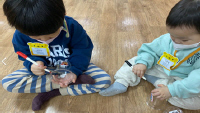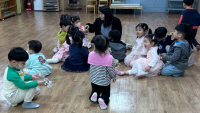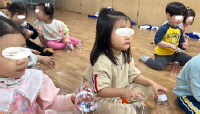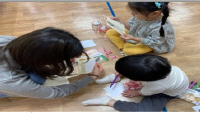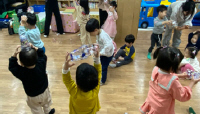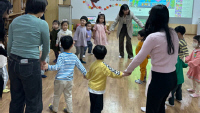 |
 |
- Search
| Korean J General Edu > Volume 17(4); 2023 > Article |
|
Abstract
ļ│Ė ņŚ░ĻĄ¼ļŖö ļīĆĒĢÖņØś ĻĄÉņ¢æĻĄÉņ£Ī ŌĆśļ¼ĖĒÖöņśłņłĀĻĄÉņ£Ī ĒśäņןņØś ņØ┤ĒĢ┤ņÖĆ ņŗżņŖĄŌĆÖ ĻĄÉĻ│╝ļ¬®ņØä ļ░öĒāĢņ£╝ļĪ£ ņ¦ĆņŚŁņé¼ĒÜīņÖĆ ĒĢ©Ļ╗śĒĢśļŖö ļ¼ĖĒÖöņśłņłĀĻĄÉņ£ĪņŚÉņä£ ļīĆĒĢÖņāØņØś ĒśäņןņŗżņŖĄ ĒöäļĪ£ņĀØĒŖĖļź╝ ĒåĄĒĢ£ ĒöäļĪ£ĻĘĖļש Ļ░£ļ░£ ļ░®ņĢłĻ│╝ ĒśäņןņŗżņŖĄ ĒÜ©Ļ│╝ļź╝ ļČäņäØĒĢśņŚ¼ ĒĢÖņŖĄņØś ĒÜ©ņ£©ņä▒ņØä ļåÆņØ┤ļŖö ļŹ░ ļ¬®ņĀüņØ┤ ņ׳ļŗż. ņŚ░ĻĄ¼ļīĆņāüņØĆ Sņŗ£ ņåīņ×¼ņØś 4ļģäņĀ£ ļīĆĒĢÖņŚÉņä£ ŌĆśļ¼ĖĒÖöņśłņłĀĻĄÉņ£Ī ĒśäņןņØś ņØ┤ĒĢ┤ņÖĆ ņŗżņŖĄŌĆÖ ĻĄÉņ¢æĻ│╝ļ¬®ņØä ņłśĻ░ĢĒĢ£ ĒĢÖņāØ 6ļ¬ģņØ┤ļŗż. ņłśņŚģ ņÜ┤ņśüņØĆ 15ņŻ╝Ļ░äņ£╝ļĪ£ ļ¼ĖĒÖöņśłņłĀĻĄÉņ£ĪĒśäņן ņØ┤ĒĢ┤ņÖĆ ĒāÉņāē, ĒśäņןņŗżņŖĄ ņżĆļ╣ä ļ░Å Ļ│äĒÜŹ, ĒśäņןņŗżņŖĄ ĒöäļĪ£ņĀØĒŖĖļź╝ ņ¦äĒ¢ēĒĢśņśĆļŗż. ņŚ░ĻĄ¼ļ░®ļ▓ĢņØĆ Ļ░£ļ│äļ®┤ņĀæĻ│╝ Ēżņ╗żņŖżĻĘĖļŻ╣ļ®┤ņĀæ(FGI)ņØä ĒåĄĒĢ┤ ņ¦łņĀü ņŚ░ĻĄ¼ļź╝ ņłśĒ¢ēĒĢśņśĆļŗż. ņŚ░ĻĄ¼Ļ▓░Ļ│╝ ņ▓½ņ¦Ė, ņ¦ĆņŚŁņé¼ĒÜīņÖĆ ĒĢ©Ļ╗śĒĢśļŖö ļ¼ĖĒÖöņśłņłĀĻĄÉņ£ĪņŚÉņä£ ĒśäņןņŗżņŖĄņØä ņ£äĒĢ£ ĒöäļĪ£ĻĘĖļש ņĀüņÜ® ļ░Å ņé¼ļĪĆ ļČäņäØņØä ĒåĄĒĢ┤ ņ×ÉņŗĀĻ░É Ē¢źņāüņØ┤ ĒÖĢņØĖļÉśņŚłļŗż. ļæśņ¦Ė, ļ¼ĖĒÖöņśłņłĀĻĄÉņ£Ī ĒśäņןņŗżņŖĄ ĒöäļĪ£ņĀØĒŖĖ ĒÖ£ļÅÖņØä ĒåĄĒĢ┤ ĒĢÖņāØļōżņØ┤ ņāüĒśĖņ×æņÜ® Ļ│╝ņĀĢņŚÉņä£ ņ×ÉņŗĀņØś ņĀĢņ▓┤ņä▒ņØä ņ░ŠĻ│Ā ņØĖņä▒ ĒĢ©ņ¢æņ£╝ļĪ£ ļ░£ĒśäņØ┤ ļéśĒāĆļé¼ļŗż. ņģŗņ¦Ė, ļ¼ĖĒÖöņśłņłĀĻĄÉņ£ĪņØś ņżæņÜöņä▒ņØä Ļ░üņØĖĒĢśļŖö Ļ│äĻĖ░Ļ░Ć ļÉśņŚłņ£╝ļ®░, ļ¼ĖĒÖöņśłņłĀĻĄÉņ£Ī ļČäņĢ╝ņØś ņ¦äļĪ£ņÖĆ ņĘ©ņŚģ ņØśņé¼Ļ▓░ņĀĢņŚÉ ļ╣äņĀäņØä ĒÆłņØä ņłś ņ׳ļÅäļĪØ ļÅäņøĆņØä ņŻ╝ņŚłļŗż. ļ│Ė ņŚ░ĻĄ¼ņØś ņŗ£ņé¼ņĀÉņØĆ ļīĆĒĢÖņāØļōżņØś ļ¼ĖĒÖöņśłņłĀ ĒöäļĪ£ĻĘĖļש Ļ░£ļ░£ņŚÉ ļīĆĒĢ£ ņ×ÉņŗĀĻ░É Ļ│ĀņĘ© ļ░Å ņØĖņä▒ņØä ĒĢ©ņ¢æĒĢśļŖö ņŗżņ▓£ņØś ļÅÖĻĖ░ļČĆņŚ¼Ļ░Ć ļÉśņŚłļŗżļŖö ņĀÉņØ┤ļŗż. ļśÉĒĢ£ ĻĄÉņ¢æĻĄÉņ£Īņ£╝ļĪ£ņä£ņØś ņ¦ĆņŚŁņé¼ĒÜīņÖĆ ĒĢ©Ļ╗śĒĢśļŖö ļ¼ĖĒÖöņśłņłĀĻĄÉņ£ĪņŚÉ ļīĆĒĢ£ ņØĖņŗØ ņĀ£Ļ│ĀņÖĆ ļ¼ĖĒÖöņśłņłĀĻĄÉņ£Ī ļČäņĢ╝ļĪ£ņØś ņ¦äļĪ£ņÖĆ ņĘ©ņŚģņŚÉ ļīĆĒĢ£ Ļ┤Ćņŗ¼ņØä ļåÆņØ┤Ļ▓ī ļÉśņŚłļŗżļŖö Ļ▓āņØ┤ļŗż. ņØ┤ņŚÉ ņ¦ĆņŚŁņé¼ĒÜīņÖĆ ĒĢ©Ļ╗śĒĢśļŖö ļ¼ĖĒÖöņśłņłĀĻĄÉņ£ĪņŚÉņä£ ŌĆśļ¼ĖĒÖöņśłņłĀĻĄÉņ£Ī ĒśäņןņØś ņØ┤ĒĢ┤ņÖĆ ņŗżņŖĄŌĆÖņØĆ ņ¦üļ¼┤ņŚŁļ¤ē ĻĄÉņ¢æĻ│╝ļ¬®ņØä ņÜ┤ņśüĒĢśļŖö ĻĖ░ņ┤łņ×ÉļŻīņŚÉ ļÅäņøĆņØ┤ ļÉĀ Ļ▓āņ£╝ļĪ£ ņé¼ļŻī ļÉ£ļŗż.
Abstract
This study aims to improve the efficiency of learning by analyzing program development plans and field practice effects through college studentsŌĆÖ field practice projects in culture and arts education with the community based on the subject of ŌĆśUnderstanding and Practicing Fields of Culture and Arts EducationŌĆÖ in liberal arts education at universities. It aims to elevate The subjects of the study were six students who took the liberal arts course of ŌĆśUnderstanding and Practice in the Field of Culture and Arts EducationŌĆÖ at a four-year university located in S city. Class operation was conducted for 15 weeks, understanding and exploring the field of cultural arts education, preparation and planning for field practice, and field practice project. As for the research method, qualitative research was conducted through individual interviews and focus group interviews (FGI). As a result of the study, first, it confirmed that self-confidence was improved through the application of programs for field practice and case analysis in cultural arts education with the local community. Second, through cultural arts education field practice project activities, the study confirmed that students found their identity in the process of interaction and developed character. Third, it served as an opportunity to imprint the importance of arts and culture education, and helped them to have a vision for career and employment decision-making in the field of culture and arts education. The implication of this study is that college students were motivated to practice cultivating their character and instilling confidence in the development of cultural and arts programs. In addition, awareness of cultural arts education with the local community as a liberal arts education has increased, and interest in career and employment in the field of cultural arts education has increased. Therefore, it is considered that ŌĆśunderstanding and practice of cultural arts education fieldŌĆÖ in cultural arts education with the local community will be helpful as basic data for operating job competency liberal arts courses.
21ņäĖĻĖ░ļŖö ļ¼ĖĒÖöņØś ņŗ£ļīĆļØ╝ļŖö Ļ▓āņ£╝ļĪ£ ļīĆļ│ĆļÉśļŖö ņŗ£ņĀÉņŚÉņä£ ļ¼ĖĒÖöņśłņłĀĻĄÉņ£ĪņØ┤ļØ╝ļŖö ņāłļĪ£ņÜ┤ ņéČņØś Ļ░Ćņ╣śĻ░Ć ļČĆĻ░üļÉśĻ│Ā ņ׳ļŗż. ļ¼ĖĒÖöņśłņłĀĻĄÉņ£ĪņØĆ ņśłņłĀĻĄÉņ£ĪņØä ĻĖ░ļ░śņ£╝ļĪ£ ņ¦ĆĒ¢źĒĢśļŖö ļ»ĖņĀü Ļ░Éņłśņä▒ ĒĢ©ņ¢æĻ│╝ ņ░ĮņØśņä▒ ņ£Īņä▒, ņĀĢņä£ ĒĢ©ņ¢æņØä ĒåĄĒĢ┤ ļ¬©ļōĀ ņé¼ļ×īņØś ņéČņØś ņ¦łņØä Ē¢źņāüņŗ£ĒéżĻ│Ā ĻĄŁĻ░ĆņĀü ņ░©ņøÉņØś ļ¼ĖĒÖöņŚŁļ¤ē Ļ░ĢĒÖöļź╝ ņ¦ĆĒ¢źĒĢśļŖö ĻĄÉņ£ĪņØ┤ļØ╝Ļ│Ā ņĀĢņØś(ĒÖ®ņŚ░ņŻ╝, ņĀĢņŚ░Ēؼ, 2004)ĒĢĀ ņłś ņ׳ļŗż. ņØ┤ļŖö ņśłņłĀĻĄÉņ£ĪņØä ņłśļŗ©ņ£╝ļĪ£ ĒÖ£ņÜ®ĒĢśņŚ¼ ļ¼ĖĒÖö ņ░ĮņĪ░ļĀź ļ░Å ļ¼ĖĒÖö Ē¢źņ£Ā ļŖźļĀźņØä Ē¢źņāüņŗ£ĒéżļŖö ĻĄÉņ£Īņ£╝ļĪ£, ņśłņłĀņØä ĒåĄĒĢ£ ļ¼ĖĒÖöņśłņłĀĻĄÉņ£ĪņØś ņØśļ»ĖļĪ£ ļ░øņĢäļōżņØ┤Ļ│Ā ņ׳ļŗż.
ļ░śļ®┤, ļē┤ļģĖļ®Ć ņŗ£ļīĆļź╝ Ļ▓ĮĒŚśĒĢ£ 4ņ░© ņé░ņŚģĒśüļ¬ģ ņåŹņŚÉņä£ ļīĆĒĢÖņØĆ ņ¦ĆņŗØņØä ļäśņ¢┤ ņŚŁļ¤ēĻ│╝ ĻĄÉņ¢æņŚÉ ņŻ╝ļ¬®ĒĢśņśĆĻ│Ā, ĒśüņŗĀņĀüņØĖ ĻĄÉņ£ĪĒÖśĻ▓ĮņØś ļ│ĆĒÖöļź╝ ļÅäļ¬©ĒĢśĻ│Ā ņ׳ļŗż(ņåÉņóģĒśä, 2022; ĒĢ£ĻĄŁĻĄÉņ£ĪĻ░£ļ░£ņøÉ, 2020). ņØ┤ļ¤¼ĒĢ£ ĻĄÉņ£ĪĒÖśĻ▓ĮņØś ļ│ĆĒÖöļŖö ļ¼ĖĒÖöņśłņłĀĻĄÉņ£ĪņØ┤ ņéČņØś ņżæņŗ¼ņĀü Ļ░Ćņ╣śļĪ£ ĒÖĢņØĖĒĢśņśĆĻ│Ā, ņØ┤ņŚÉ ļö░ļźĖ ņĀäļ¼Ė ņØĖļĀźņ¢æņä▒ņØ┤ ĒĢäņÜöĒĢ£ Ļ▓āņ£╝ļĪ£ ņ×æņÜ®ĒĢśĻ▓ī ļÉśņŚłļŗż. ņØ┤ļ¤¼ĒĢ£ ĒĢäņÜöņŚÉ ļö░ļØ╝ ļÅäņ×ģĒĢśĻ▓ī ļÉ£ ļ¼ĖĒÖöņśłņłĀĻĄÉņ£Īņé¼ņØś ņ×ÉĻ▓®ņĀ£ļÅäļŖö ļ¼ĖĒÖöņśłņłĀ ņĀäļ¼Ėņä▒ņØä ĻĖ░ļ░śņ£╝ļĪ£ ņÜ░ņłśĒĢ£ ņØĖņä▒Ļ│╝ ņ×Éņ¦łņØä Ļ░¢ņČś ĻĄÉņ£Īņ×Éļź╝ ļ░░ņČ£ĒĢśņŚ¼ ļ¼ĖĒÖöņśłņłĀĻĄÉņ£ĪņØś ņ¦łņĀü ņä▒ņןņØä ļÅäļ¬©ĒĢśļÅäļĪØ ĒĢśņśĆļŗż.
ļ¼ĖĒÖöņ▓┤ņ£ĪĻ┤ĆĻ┤æļČĆ(ļ¼ĖĒÖöņ▓┤ņ£ĪĻ┤ĆĻ┤æļČĆ, 2014)ļŖö ’Įóļ¼ĖĒÖöņśłņłĀĻĄÉņ£Ī ņżæņןĻĖ░ ļ░£ņĀäĻ│äĒÜŹ’ĮŻņŚÉņä£ ļ¼ĖĒÖöņśłņłĀĻĄÉņ£ĪņØä ĒåĄĒĢ£ ĻĄŁļ»╝ Ē¢ēļ│ĄņŗżĒśä, ļ¼ĖĒÖöņśłņłĀĻĄÉņ£ĪņØś ļé┤ņŗżĒÖöļź╝ ņ£äĒĢ£ ņĀäļץĻ│╝ ĒĢĄņŗ¼Ļ│╝ņĀ£ļź╝ ļ░£Ēæ£ĒĢśļ®┤ņä£ ŌĆśļ¼ĖĒÖöņśłņłĀĻĄÉņ£Īņé¼ŌĆÖ ņ×ÉĻ▓®ņĀ£ļÅäļź╝ ņČöņ¦äĒĢśņśĆļŗż(ņØ┤ņŻ╝ņŚ░, 2012). Ļ╣ĆņØĖņäż ņÖĖ(2014)ļŖö ļ¼ĖĒÖöņśłņłĀĻĄÉņ£Īņé¼ ņ×ÉĻ▓®ņĀ£ļÅäļź╝ ĻĄŁĻ░ĆņĀüņ£╝ļĪ£ ļÅäņ×ģĒĢśĻ▓ī ļÉ£ ļ░░Ļ▓ĮņŚÉļŖö ļ¼ĖĒÖö ļ│Ąņ¦ĆņØś ņŗżĒśä, ņśłņłĀņØĖ ņØ╝ņ×Éļ”¼ ņ░ĮņČ£, ĒÜ©ņ£©ņĀü ļ¼ĖĒÖöņśłņłĀĻĄÉņ£Ī ņØĖļĀźņØś ņŚŁļ¤ēĻ░ĢĒÖö, Ļ┤Ćļ”¼Ļ░£ņäĀņØ┤ ĒĢäņÜöĒĢśļŗżĻ│Ā ļ│┤ņĢśļŗż. Ļ╣ĆņäĀņĢä(2016)ļŖö ĻĖ░ņĪ┤ ņśłņłĀ Ļ░Ģņé¼ņĀ£ļÅäļź╝ ĻĖ░ļ░śņ£╝ļĪ£ ĻĄŁĻ░Ćņ×ÉĻ▓® ņĀ£ļÅäļź╝ ļÅäņ×ģĒĢśņŚ¼ ļ¼ĖĒÖöņśłņłĀĻĄÉņ£ĪņØś ņĀäļ¼ĖņØĖļĀźņŚÉ ļīĆĒĢ£ ņé¼ĒÜīņĀü ņŗĀļó░ļź╝ ĒÜŹļōØĒĢśļ®░, ļ¼ĖĒÖöņśłņłĀĻĄÉņ£ĪņØä ņ£äĒĢ£ ņØĖļĀź ņ¢æņä▒ĻĖ░Ļ┤ĆņØä ĒÖĢņןĒĢśĻ│Āņ×É ĒĢśļŖö ļ¬®ņĀüņ£╝ļĪ£ ņČ£ļ░£ĒĢśņŚ¼ ņ¦üņŚģņ£╝ļĪ£ņä£ ļ¼ĖĒÖöņśłņłĀ ņĀäļ¼ĖĻ░ĆņØś ņ¢æņä▒ņØä ņČöņ¦äĒĢśĻ│Āņ×É ĒĢ£ Ļ▓āņ£╝ļĪ£ ļ░ØĒ׳Ļ│Ā ņ׳ļŗż. ņØ┤ļ¤¼ĒĢ£ ļ░░Ļ▓ĮņØĆ ļ¼ĖĒÖöņśłņłĀĻĄÉņ£Ī ņĀäļ¼Ė ņØĖļĀźņØś ņ×ÉĻ▓®ņÜöĻ▒┤ņØä ļ│┤ļŗż ļ¬ģĒÖĢĒ׳ ĒĢśņŚ¼ ņé¼ĒÜīņĀü ņŗĀļó░ ĻĖ░ļ░śņØä ĻĄ¼ņČĢĒĢśļŖö Ļ▓āņØ┤ļŗż. ļö░ļØ╝ņä£ ĒÖ£ļÅÖ ĻĘ╝Ļ▒░ņÖĆ ņ£äņāüņØä ņ×¼Ļ│ĀĒĢśņŚ¼ Ļ┤ĆļĀ© ņØĖļĀźņØś ņ×ÉĻĖŹņŗ¼Ļ│╝ ņ×ÉņĪ┤Ļ░ÉņØä Ļ│ĀņĘ©ĒĢĀ ņłś ņ׳ņØä Ļ▓āņ£╝ļĪ£ ĒīÉļŗ©ļÉśļ®░ ĻĄŁņĀ£ĒÖö, ļŗżņ¢æĒÖö ņŗ£ļīĆļź╝ ļ¦×ņĢä ļ¼ĖĒÖöņśłņłĀĻĄÉņ£Ī ņØĖļĀźņ¢æņä▒ ĻĖ░Ļ┤ĆņØä ļŗżņøÉĒÖöĒĢśļŖö ļŹ░ ņ׳ļŗż(ĒĢ£ĻĄŁļ¼ĖĒÖöņśłņłĀĻĄÉņ£Īņ¦äĒØźņøÉ, 2016)Ļ│Ā ļ│┤ņĢśļŗż.
ļ¼ĖĒÖöņśłņłĀĻĄÉņ£Īņé¼ ņ×ÉĻ▓®Ļ│╝ņĀĢņŚÉņä£ ŌĆśļ¼ĖĒÖöņśłņłĀĻĄÉņ£Ī ĒśäņןņØś ņØ┤ĒĢ┤ņÖĆ ņŗżņŖĄŌĆÖ ĻĄÉĻ│╝ļ¬®ņØĆ ļ¼ĖĒÖöņśłņłĀĻĄÉņ£Īņé¼ ņ×ÉĻ▓®ņ”ØņØś Ļ│ĄņŗĀļĀź ĒÖĢļ│┤ņÖĆ ĒĢ©Ļ╗ś ļ¼ĖĒÖöņśłņłĀĻĄÉņ£Īņé¼ņØś ĒśäņןņŗżņŖĄņØä ņØ┤ņłśĒĢ┤ņĢ╝ ĒĢśļŖö Ļ▓āņ£╝ļĪ£ ņØ┤ļź╝ ņ£äĒĢ£ ņÜ┤ņśüļ░®ņĢł ļ░Å ĻĄÉņ£Ī ĒÜ©Ļ│╝ņŚÉ Ļ┤Ćņŗ¼ņØ┤ ņÅĀļ”¼Ļ│Ā ņ׳ļŗż(ĻČīļé©Ēؼ ņÖĖ, 2017). ĒśäņןņŗżņŖĄņØĆ ĻĄÉņ£ĪĻ│╝ņĀĢ ņżæņŚÉ ņŖĄļōØĒĢ£ ņØ┤ļĪĀĻ│╝ ņøÉļ”¼ ļ░Å ĻĖ░ņłĀņØä ĒśäņןņŚÉņä£ ņŗżņĀ£ļĪ£ ņĀüņÜ®ĒĢ┤ļ│┤Ļ│Ā ĻĘĖ ĒāĆļŗ╣ņä▒ņØä Ļ▓Ćņ”ØĒĢśĻ│Ā Ļ░£ņäĀĒĢśņŚ¼ ļé┤ļ®┤ĒÖöņŗ£Ēé┤ņ£╝ļĪ£ ņ¦üņŚģļŖźļĀźņØä ĒÜ©Ļ│╝ņĀüņ£╝ļĪ£ ņłśĒ¢ēĒĢĀ ņłś ņ׳ļŖö ņĀäļ¼ĖņĀüņØĖ ĻĄÉņ£Īņé¼Ļ░Ć ļÉśĻĖ░ ņ£äĒĢ£ ņóģĒĢ®ņĀü ņ▓┤ĒŚś ļ░Å ņŗżĒŚśĻ│╝ņĀĢņØ┤ļØ╝ ĒĢĀ ņłś ņ׳ļŗż(ņןļŹĢņé╝ ņÖĖ, 2002).
ņØ┤ņ▓śļ¤╝ ĒśäņןņŗżņŖĄņØĆ ņśłļ╣ä ļ¼ĖĒÖöņśłņłĀĻĄÉņ£Īņé¼ļōżņŚÉĻ▓ī ĻĄÉņ£ĪĻ│╝ņĀĢņØä ĒåĄĒĢ┤ ļ░░ņÜ┤ ņØ┤ļĪĀĻ│╝ ņŗżļ¼┤ļź╝ ĒśäņןņŚÉ ņĀüņÜ®ĒĢ┤ļ│┤Ļ│Ā ņ×ÉņŗĀņØä ĒÅēĻ░ĆĒĢ┤ ļ│╝ ņłś ņ׳ļŖö ņŗ£Ļ░äņØ┤ ļÉ£ļŗż. ļśÉĒĢ£ ņØ┤ļĪĀĻ│╝ ĒśäņŗżņØś ņ░©ņØ┤ļź╝ ĒÖĢņØĖĒĢśļŖö ĻĖ░ĒÜīņØ┤ņ×É ņ×ÉĻ▓®ņ”ØņØä ņĘ©ļōØĒĢ£ ĒøäņŚÉļŖö ļ¼ĖĒÖöņśłņłĀĻĄÉņ£ĪņŚÉ ļīĆĒĢ£ ĒśäņןĻ▓ĮĒŚśņ£╝ļĪ£ ņ▓┤ĒŚśņØś ĻĖ░ĒÜīĻ░Ć ļÉ£ļŗż. ņ¦ĆņŚŁņé¼ĒÜīņØś ņŗżņŖĄ ĻĖ░Ļ┤ĆņØĆ ņŗżņŖĄņāØļōżņØä Ļ┤Ćļ”¼ĒĢśļ®┤ņä£ ņĀ£ļÅäņŚÉ ļīĆĒĢ£ ņØ┤ĒĢ┤ ļ░Å ļ¼ĖĒÖöņśłņłĀĻĄÉņ£Ī ņØĖņĀüņ×ÉņøÉņ£╝ļĪ£ņØś ĒÖ£ņÜ® ļ░®ļ▓ĢņØä ļ¬©ņāēĒĢśĻ│Ā, ļ¼ĖĒÖöņśłņłĀĻĄÉņ£Īņé¼ņŚÉ ļīĆĒĢ£ ņØĖņŗØņØä Ļ░£ņäĀĒĢśņŚ¼ Ļ┤Ćļé┤ ļ¼ĖĒÖöņśłņłĀĻĄÉņ£Īņé¼ ļ░░ņ╣śļź╝ ņłÖĻ│ĀĒĢ┤ ļ│╝ ĻĖ░ĒÜīļź╝ Ļ░Ćņ¦ł ņłś ņ׳ļŗż(ĻČīļé©Ēؼ ņÖĖ, 2017, p. 57).
ņØ┤ņāüņØś ļģ╝ņØśļź╝ ĻĖ░ļ░śņ£╝ļĪ£ ņÜöņĢĮĒĢśļ®┤ ļīĆĒĢÖņØś ļ¼ĖĒÖöņśłņłĀĻĄÉņ£Ī ņ¢æņä▒Ļ│╝ņĀĢņØĆ ŌĆśļ¼ĖĒÖöņśłņłĀĻĄÉņ£Ī ĒśäņןņØś ņØ┤ĒĢ┤ņÖĆ ņŗżņŖĄŌĆÖņØś ĻĄÉņ¢æ ĻĄÉĻ│╝ļ¬®ņŚÉņä£ ĒśäņןņŗżņŖĄņØä ņ£äĒĢ┤ ņ¦ĆņŚŁņé¼ĒÜīņÖĆ ņŚ░Ļ│äĒĢśņŚ¼ ņÜ┤ņśüĒĢśļŖö Ļ▓āņ£╝ļĪ£ņä£ ļ¼ĖĒÖöņśłņłĀĻĄÉņ£ĪņØś ĻĖ░ļŖźņĀü ņŚŁĒĢĀņØä ĒÖĢļīĆĒĢĀ ņłś ņ׳ļŗż. ņØ┤ļŖö ļīĆĒĢÖņāØņØś ļ¼ĖĒÖöņśłņłĀĻĄÉņ£Ī ĒśäņןņŗżņŖĄ Ļ▓ĮĒŚśņØä ĒåĄĒĢ┤ ļ¼ĖĒÖöņśłņłĀĻĄÉņ£Ī ĒöäļĪ£ĻĘĖļשņØä Ļ░£ļ░£ĒĢśņŚ¼ ņĀüņÜ®ĒĢ┤ļ┤äņ£╝ļĪ£ņŹ©, ņ×ÉņŗĀņØś ņŚŁļ¤ēņØä ĒÜ©Ļ│╝ņĀüņ£╝ļĪ£ Ļ░£ļ░£ ĒĢĀ ņłś ņ׳ļŖö ņ▓┤ĒŚśņØś ĻĖ░ĒÜīļĪ£ ņØśļ»Ė ņ׳ļŖö Ļ▓ĮĒŚśņØä ĒĢśĻ▓ī ļÉ£ļŗż.
ļ¼ĖĒÖöņśłņłĀĻĄÉņ£ĪņØś ņäĀĒ¢ēņŚ░ĻĄ¼ļź╝ ņé┤ĒÄ┤ļ│┤ļ®┤, ĒĢ£ĻĄŁļ¼ĖĒÖöņśłņłĀĻĄÉņ£Īņ¦äĒØźņøÉ(2015)ņŚÉņä£ļŖö ņ░ĮņØśņĀü ņØĖņ×¼ņ¢æņä▒ņØś Ļ│äĒÜŹņ£╝ļĪ£ ņśłņłĀĻĄÉņ£ĪņØä Ļ░ĢĒÖöĒĢśĻ│Ā ņ׳Ļ│Ā Ļ│ĄĒåĄņ£╝ļĪ£ ļ¼ĖĒÖöņśłņłĀņØ┤ ļŗżļźĖ ņØ╝ļ░ś Ļ│╝ļ¬®ļōżņØś ņ¦ĆņŗØņØä ĒåĄĒĢ®ĒĢśĻ│Ā ņØ┤ļź╝ ņ░ĮņØśņĀüņ£╝ļĪ£ ĒÖ£ņÜ®ĒĢĀ ņłś ņ׳ļŖö ņłśļŗ©ņØ┤ ļÉĀ ņłś ņ׳ļŗżĻ│Ā ĒÅēĻ░ĆĒĢśĻ│Ā ņ׳ļŗż. Ļ╣Ćņóģļ░▒(2010)ņØĆ ļ¼ĖĒÖöņśłņłĀĻĄÉņ£ĪņØś ļ¬®Ēæ£ļĪ£ ņ░ĮņØśņä▒ņØś ņĀ£Ļ│Āļź╝ ļōżĻ│Ā ņ׳ņ£╝ļ®░, Gardner(1993)ļŖö ļ¼ĖĒÖöņśłņłĀĻĄÉņ£ĪņØä ĒåĄĒĢśņŚ¼ ļłäĻĄ¼ņŚÉĻ▓īļéś ņ׳ļŖö ņ×æņØĆ ņ░ĮņØśņä▒ņØä ļ░£Ļ▓¼ĒĢśĻ│Ā ĻĘĖĻ▓āņØä Ļ░£ļ░£ĒĢśĻ▓ī ĒĢ©ņ£╝ļĪ£ņŹ© Ļ░£Ļ░£ņØĖņØ┤ ļ¦īņĪ▒ĒĢ£ ņéČņØä ļłäļ”┤ ņłś ņ׳Ļ▓ī ļÅäņøĆņØä ņżĆļŗżļŖö Ļ▓āņØ┤ļŗż. ļśÉĒĢ£, ļ¼ĖĒÖöņÖĆ ņśłņłĀņØĆ ņØĖĻ░äņØś ļé┤ļ®┤ņäĖĻ│äņŚÉ ņ¦üņĀæņĀüņØĖ ņśüĒ¢źņØä ņŻ╝ļŖö Ļ▓āņ£╝ļĪ£ ņĀĢņä£ņĀü ņĢłņĀĢņØä Ļ░ĆņĀĖņśżļŖö ņĀüņĀłĒĢ£ ĒÖ£ļÅÖņØ┤ ļÉ£ļŗż(Ļ░ĢņØĆņśü, ņĄ£ļ»ĖņłÖ, 2014)ļŖö Ļ▓āņØ┤ļŗż. ņ”ē, ņØĖĻ░äņØĆ ņĢäļ”äļŗżņÜ┤ ņØīņāēĻ│╝ ĻĘĖļ”╝ņŚÉ Ļ┤Ćņŗ¼ņØä ļ│┤ņØ┤ļ®░ ņŚ¼ļ¤¼ Ļ░Ćņ¦Ć ņØīņĢģņØ┤ļéś ņśłņłĀņ×æĒÆłņØä ņ¦üņĀæ ļ¬Ėņ£╝ļĪ£ Ēæ£ĒśäĒĢ┤ ļ│┤ļŖö ļō▒ ņØīņĢģ, ļ»ĖņłĀ, ļÅÖņ×æ ļō▒Ļ│╝ Ļ░ÖņØĆ ņśłņłĀ ĒÖ£ļÅÖņØä ĒåĄĒĢ┤ ņĀĢņä£ņĀü Ēæ£ĒśäĻ│╝ ņĢłņĀĢĻ░ÉņØä Ļ░¢ļŖöļŗż. ļö░ļØ╝ņä£ ņśłņłĀņØĆ ļ¬©ļ░®ņŚÉņä£ ĻĖ░ļŖźņ£╝ļĪ£, ĻĖ░ļŖźņŚÉņä£ ļé┤ļ®┤ņØś ņĀĢņä£ļź╝ Ēæ£ĒśäĒĢśļ®░ ņĀĢĒÖöņĀü ĻĖ░ļŖźņØ┤ ļŹöĒĢ┤ņĀĖ ņĀĢņä£ņĀü Ļ░Éņłśņä▒ņØä ĻĖĖļ¤¼ ņĀĢņä£ņĀü ļŖźļĀź Ē¢źņāüņŚÉ ĒÜ©Ļ│╝ņĀüņØ┤ļŗż(Ļ╣Ćļ¬ģņł£, ņĪ░Ļ▓Įņ×É, 1998). Ļ░ĢņØĆņśüĻ│╝ ņĄ£ļ»ĖņłÖ(2014)ņØĆ ņśłņłĀņØś ņ░Įņ×æĻ│╝ Ē¢źņ£Ā, ņśłņłĀņØä ĒåĄĒĢ£ ļŗżļźĖ ņé¼ļ×īĻ│╝ņØś ņåīĒåĄĻ│╝ ņØ┤ĒĢ┤ļź╝ ĒåĄĒĢ┤ ļ¼ĖĒÖöņśłņłĀņØä ņ”ÉĻĖ░ļŖö ļŹ░ ņ┤łņĀÉņØä ļ¦×ņČöļŖö Ļ▓āņØ┤ļŗż. ņØ┤ļŖö ļ¼ĖĒĢÖ, ļ»ĖņłĀ, ņØīņĢģ, ņŚ░ĻĘ╣, ņŗĀņ▓┤Ēæ£Ēśä, ņśüņāü, ņé¼ņ¦ä ļČäņĢ╝ ļō▒ņØś ļŗżņ¢æĒĢ£ ļ¼ĖĒÖöņśłņłĀ ņśüņŚŁņØä ņżæņŗ¼ņ£╝ļĪ£ ļ¼ĖĒÖöņśłņłĀ ņśüņŚŁ ļé┤ ĒåĄĒĢ®, ļ¼ĖĒÖöņśłņłĀ ņśüņŚŁ Ļ░ä ĒåĄĒĢ®, ļ¼ĖĒÖöņśłņłĀ ņśüņŚŁĻ│╝ ņé¼ĒÜī, Ļ│╝ĒĢÖ ļō▒Ļ│╝ Ļ░ÖņØĆ ļŗżļźĖ ņśüņŚŁĻ│╝ņØś ĒåĄĒĢ®ņØä ĻĄ¼ņä▒ĒĢĀ ņłś ņ׳ņØīņØä ļ░ØĒ׳Ļ│Ā ņ׳ļŗż.
ļ│Ė ņŚ░ĻĄ¼ņŚÉņä£ļŖö ņäĀĒ¢ēņŚ░ĻĄ¼ņØś Ļ│Āņ░░ņØä ĒåĄĒĢ┤ ŌĆśļ¼ĖĒÖöņśłņłĀĻĄÉņ£Ī ĒśäņןņØś ņØ┤ĒĢ┤ņÖĆ ņŗżņŖĄŌĆÖņØä ļ░öĒāĢņ£╝ļĪ£ ĒĢ£ ņ¦ĆņŚŁņé¼ĒÜīņÖĆ ĒĢ©Ļ╗śĒĢśļŖö ļ¼ĖĒÖöņśłņłĀĻĄÉņ£ĪņØś ĒśäņןņŗżņŖĄņŚÉņä£ ņĀüņÜ®ĒĢśļŖö ĒöäļĪ£ĻĘĖļש ļ░®ņĢłņØä ņĀ£ņŗ£ĒĢ£ļŗż. ļśÉĒĢ£ ļīĆĒĢÖņāØņØś ļ¼ĖĒÖöņśłņłĀĻĄÉņ£Ī ĒśäņןņŗżņŖĄ Ļ▓ĮĒŚś ĒÜ©Ļ│╝ļź╝ ļČäņäØĒĢśņŚ¼ ņ¦üļ¼┤ņŚŁļ¤ē ĻĄÉņ¢æĻ│╝ļ¬®ņØä ņÜ┤ņśüĒĢśļŖö ĻĖ░ņ┤łņ×ÉļŻīļĪ£ ĒÖ£ņÜ®ĒĢśļŖö ļŹ░ ņØśļ»Ėļź╝ ļæÉĻ│Āņ×É ĒĢ£ļŗż.
ļ¼ĖĒÖöņśłņłĀĻĄÉņ£Īņé¼ ņ×ÉĻ▓®ņĀ£ļÅäņØś ļÅäņ×ģļ░░Ļ▓ĮņØĆ 2005ļģä ļ¼ĖĒÖöņśłņłĀĻĄÉņ£Ī ņ¦ĆņøÉļ▓Ģ ņĀ£ņĀĢ ņØ┤Ēøä, ļ¼ĖĒÖöņśłņłĀĻĄÉņ£Ī ņĀĢņ▒ģņé¼ņŚģņØ┤ ĒÖĢļīĆļÉśĻ│Ā ļ¼ĖĒÖöņśłņłĀĻĄÉņ£Ī ņØĖļĀź ņłśņÜöĻ░Ć ņ”ØĻ░ĆĒĢ©ņŚÉ ļö░ļØ╝ ļ¼ĖĒÖöņśłņłĀĻĄÉņ£Īņé¼ ļÅäņ×ģņØś ĒĢäņÜöņä▒ņØ┤ ļåÆņĢäņĪīļŗż. ņØ┤ņŚÉ ļ¼ĖĒÖöņśłņłĀĻĄÉņ£Ī ņØĖļĀźņ¢æņä▒ Ļ▓ĮļĪ£ļź╝ ļŗżņ¢æĒÖöĒĢśĻ│Ā ļ▓ĢļĀ╣ņŚÉ ņ×ÉĻ▓®ņØä ņĀĢĒĢ©ņ£╝ļĪ£ņŹ© ļ¼ĖĒÖöņśłņłĀĻĄÉņ£Ī ņØĖļĀźņŚÉ ļīĆĒĢ£ ņé¼ĒÜīņĀü ņŗĀļó░ļź╝ ļåÆņØ┤Ļ│Āņ×É 2012ļģä ļ¼ĖĒÖöņśłņłĀĻĄÉņ£Ī ņ¦ĆņøÉļ▓Ģ Ļ░£ņĀĢņØä ĒåĄĒĢ┤ ņ×ÉĻ▓®ņĀ£ļÅäļź╝ ļÅäņ×ģĒĢśņśĆļŗż.
ļ¼ĖĒÖöņśłņłĀĻĄÉņ£Ī ņ¦ĆņøÉļ▓Ģ(ņĀ£2ņĪ░ņĀ£5ĒśĖ)ņŚÉņä£ļŖö ŌĆØļ¼ĖĒÖöņśłņłĀĻĄÉņ£Īņé¼ļ×Ć ļ¼ĖĒÖöņśłņłĀĻĄÉņ£Ī Ļ┤ĆļĀ© ĻĄÉņøÉ ņÖĖņŚÉ ļ¼ĖĒÖöņśłņłĀĻĄÉņ£ĪņŚÉ Ļ┤ĆĒĢ£ ĻĖ░ĒÜŹŌŗģņ¦äĒ¢ēŌŗģļČäņäØŌŗģĒÅēĻ░Ć ļ░Å ĻĄÉņłś ļō▒ņØś ņŚģļ¼┤ļź╝ ņłśĒ¢ēĒĢśļŖö ņé¼ļ×īņ£╝ļĪ£ņä£ ļ▓ĢņŚÉ ļö░ļØ╝ ņ×ÉĻ▓®ņØ┤ ļČĆņŚ¼ļÉ£ ņé¼ļ×īņØä ļ¦ÉĒĢ£ļŗż.ŌĆØļØ╝Ļ│Ā ņĀĢņØśĒĢśĻ│Ā ņ׳ļŗż. ņ”ē ļ¼ĖĒÖöņśłņłĀĻĄÉņ£Īņé¼ļŖö ņśłņłĀĻ░ĆļĪ£ņä£ņØś ņĀäļ¼Ėņä▒Ļ│╝ ĻĄÉņ£ĪĻ░ĆļĪ£ņä£ņØś ņŚŁļ¤ē ļ░Å ņ×Éņ¦łņØä Ļ░¢ņČś ņĀäļ¼ĖņØĖļĀźņØä ņØśļ»ĖĒĢśļŖö ĻĄŁĻ░Ć ņ×ÉĻ▓®ņØ┤ļŗż.
ņØ┤ļ¤¼ĒĢ£ ļ░░Ļ▓ĮņØĆ ļ¼ĖĒÖöņśłņłĀĻĄÉņ£Ī ņĀäļ¼ĖņØĖļĀźņØś ņ×ÉĻ▓®ņÜöĻ▒┤ņØä ļŹöņÜ▒ ļ¬ģĒÖĢĒ׳ ĒĢśņŚ¼ ņé¼ĒÜīņĀü ņŗĀļó░ ĻĖ░ļ░śņØä ĻĄ¼ņČĢĒĢ£ļŗż. ņØ┤ļŖö ĒÖ£ļÅÖ ĻĘ╝Ļ▒░ņÖĆ ņ£äņāüņØä ņ×¼Ļ│ĀĒĢśņŚ¼ Ļ┤ĆļĀ© ņØĖļĀźņØś ņ×ÉĻĖŹņŗ¼Ļ│╝ ņ×ÉņĪ┤Ļ░ÉņØä Ļ│ĀņĘ©ĒĢĀ ņłś ņ׳ļŖö Ļ▓āņ£╝ļĪ£ ĻĄŁņĀ£ĒÖö, ļŗżņ¢æĒÖö ņŗ£ļīĆļź╝ ļ¦×ņĢä ļ¼ĖĒÖöņśłņłĀĻĄÉņ£Ī ņØĖļĀźņ¢æņä▒ ĻĖ░Ļ┤ĆņØä ļŗżņøÉĒÖö(ĒĢ£ĻĄŁļ¼ĖĒÖöņśłņłĀĻĄÉņ£Īņ¦äĒØźņøÉ, 2016)ĒĢśļŖö ļŹ░ ņ׳ļŗż.
ļ¼ĖĒÖöņśłņłĀņé¼ ĻĄÉņ£ĪĻ│╝ņĀĢņØĆ 2011ļģä 12ņøö 30ņØ╝ ŌĆśļ¼ĖĒÖöņśłņłĀĻĄÉņ£Ī ņ¦ĆņøÉļ▓ĢŌĆÖ Ļ░£ņĀĢņĢłņØ┤ ĻĄŁĒÜī ļ│ĖĒÜīņØśņŚÉņä£ ņØśĻ▓░ļÉśĻ│Ā 2012ļģä Ļ│ĄĒżŌŗģņŗ£Ē¢ēļÉ£ Ēøä, ņŚ¼ļ¤¼ Ļ░£ņĀĢĻ│╝ņĀĢņØä ĒåĄĒĢ┤ Ēśäņ×¼Ļ╣īņ¦Ć ņŗ£Ē¢ē ņÜ┤ņśüļÉśņŚłļŗż. ļ¼ĖĒÖöņśłņłĀņé¼ ņ×ÉĻ▓®ņĀ£ļÅä ļÅäņ×ģņŚÉ ļö░ļØ╝ 2014ļģä ļ¼ĖĒÖöņśłņłĀĻĄÉņ£Ī ņ¦ĆņøÉļ▓ĢņØ┤ Ļ░£ņĀĢļÉśļ®┤ņä£ ļ¼ĖĒÖöņśłņłĀĻĄÉņ£Ī ņĀäļ¼ĖņØĖļĀźņŚÉ ļīĆĒĢ£ ņŚŁļ¤ē ļ░Å ņ×ÉĻ▓® ĻĖ░ņżĆņØä ļ│┤ļŗż ļ¬ģĒÖĢĒĢśĻ▓ī ņĀ£ņŗ£ĒĢśņśĆļŗż.
ļ¼ĖĒÖöņśłņłĀĻĄÉņ£Īņé¼ņØś ņŚŁĒĢĀņØä ļ│┤ļ®┤ ņśłņłĀņĀäĻ│Ąņ×ÉļĪ£ņä£ Ļ┤Ćļ”¼ņ×É ņŚŁļ¤ē, ņ¦ĆņŚŁņĀäļ¼ĖĻ░Ć ņŚŁļ¤ē, ĒåĄĒĢ®ļ¼ĖĒÖöņśłņłĀĻĄÉņ£Ī ņŚŁļ¤ē, ļäżĒŖĖņøīĒü¼ ĒÖ£ņÜ® ņŚŁļ¤ē, Ē¢ēņĀĢ ņŚŁļ¤ē ļō▒ņØ┤ ĒĢäņÜö(ĒĢ£ĻĄŁļ¼ĖĒÖöņśłņłĀĻĄÉņ£Īņ¦äĒØźņøÉ, 2016)ĒĢ£ Ļ▓āņØ┤ļŗż. ņØ┤ļŖö ĻĖ░ņĪ┤ņØś ņśłņłĀ Ļ░Ģņé¼Ļ░Ć ĒĢśļŹś ņØ╝ņŚÉ ņĀäņŗ£, Ē¢ēņé¼ ĻĖ░ĒÜŹ, ĒöäļĪ£ĻĘĖļש ņÜ┤ņśü ļ░Å ĻĄÉņ£ĪņāØ Ļ┤Ćļ”¼, ļīĆņÖĖ ļ¦łņ╝ĆĒīģ ļ░Å Ļ▓Įņśüņ¦ĆņøÉ ņŚģļ¼┤Ļ░Ć ņČöĻ░ĆļÉ£ļŗż(Ļ░Ģņä▒ļŻĪ ņÖĖ, 2012). ļö░ļØ╝ņä£ ļ¼ĖĒÖöņśłņłĀĻĄÉņ£Īņé¼ļŖö ļ¼ĖĒÖöņśłņłĀĻ░ĆļĪ£ņä£ Ļ░£ņØĖņØś ņĀäĻ│Ą ņśłņłĀ ļČäņĢ╝ņŚÉļ¦ī ĻĄŁĒĢ£ĒĢśņ¦Ć ņĢŖĻ│Ā ņśłņłĀĻĄÉņ£Ī ņŗżņ▓£Ļ│╝ Ļ┤ĆļĀ©ļÉ£ ļŗżņ¢æĒĢ£ ņŚŁĒĢĀļĪ£ņä£ ņłśĒ¢ēĒĢĀ ņŚŁļ¤ēņØ┤ ņÜöĻĄ¼ļÉ£ļŗż(ņĄ£ņØĆņĢä ņÖĖ, 2022, p. 140).
ļ¼ĖĒÖöņśłņłĀĻĄÉņ£Īņé¼ 2ĻĖē Ļ│╝ņĀĢņØĆ 2016ļģäļČĆĒä░ ļ¼ĖĒÖöņśłņłĀĻĄÉņ£ĪņŚÉ ņ׳ņ¢┤ņä£ ĒśäņןņŚÉ ļīĆĒĢ£ ņØ┤ĒĢ┤ņÖĆ ņŚ░Ļ│äņä▒, ņ×ÉĻ▓®Ļ│╝ņĀĢņŚÉ ļīĆĒĢ£ ĒÖŹļ│┤ ļ░Å ĒāĆļŗ╣ņä▒ Ļ▓Ćņ”Ø Ļ│╝ņĀĢņØä ņ£äĒĢ┤ņä£, ĒśäņןņŗżņŖĄ Ļ┤ĆļĀ©ĒĢśņŚ¼ ŌĆśļ¼ĖĒÖöņśłņłĀĻĄÉņ£Ī ĒśäņןņØś ņØ┤ĒĢ┤ņÖĆ ņŗżņŖĄŌĆÖ Ļ│╝ļ¬®ņØä ņŗĀņäżĒĢśņŚ¼ ņÜ┤ņśüĒĢśĻ│Ā ņ׳ļŗż. ņØ┤ņŚÉ ļīĆĒĢ┤ ņśłņłĀĻĄÉņ£ĪņØĆ ĻĖ░ļ│ĖņĀüņ£╝ļĪ£ ņśłņłĀņĀü ĻĖ░ņłĀĻ│╝ ĻĄÉņ£ĪņŚÉ ļīĆĒĢ£ ņ¦ĆņŗØņØä ĒĢ©Ļ╗ś ņØ┤ļŻ©ņ¢┤ņĀĖņĢ╝ ĒĢĀ Ļ▓āņ£╝ļĪ£ ļ¼ĖĒÖöņśłņłĀĻĄÉņ£Īņé¼ļŖö ņśłņłĀņĀü ņĀäļ¼Ėņä▒Ļ│╝ ĻĄÉņ£ĪņŚÉ ļīĆĒĢ£ ņ¦ĆņŗØņØä ļ░öĒāĢņ£╝ļĪ£ ņśłņłĀĻĄÉņ£ĪņØä ņŗżĒ¢ēĒĢśļŖö ņĀäļ¼ĖĻ░ĆļĪ£ņä£ņØś ĻĄÉņłśņŚŁļ¤ēĻ│╝ ņØĖņä▒Ļ│╝ Ēā£ļÅäļź╝ Ļ░¢ņČöņ¢┤ņĢ╝ ĒĢ£ļŗżļŖö ņÜöĻĄ¼ļź╝ ļ░øĻ▓ī ļÉ£ļŗż(ņĄ£ņØĆņĢä ņÖĖ, 2022, p. 140).
ŌĆśļ¼ĖĒÖöņśłņłĀĻĄÉņ£Ī ĒśäņןņØś ņØ┤ĒĢ┤ņÖĆ ņŗżņŖĄŌĆÖ ĻĄÉĻ│╝ļ¬®ņØĆ ņłśĻ░ĢĒĢśļĀżļŖö ĒĢÖņāØļōżņØś ļ░░Ļ▓Į, ņłśņżĆĻ│╝ Ļ┤Ćņŗ¼ ļō▒ņØä Ļ│ĀļĀżĒĢśņŚ¼ ĻĄÉĻ│╝ ļé┤ņÜ®Ļ│╝ ĻĄÉņłś ļ░®ļ▓Ģ ļō▒ņØä ļŗżņ¢æĒĢśĻ▓ī ņĀ£ņŗ£ĒĢ©ņ£╝ļĪ£ņŹ© ņĀäļ¼ĖĻ░ĆļĪ£ņä£ņØś ņ¦łņĀü ņłśņżĆ ĒÖĢļ”ĮņØś ĻĖ░ĒÜīļź╝ Ļ░¢Ļ▓ī ļÉ£ļŗż. ņØ┤ļŖö ļ¼ĖĒÖöņśłņłĀĻĄÉņ£Īņé¼ ĻĄÉņ£ĪĻ│╝ņĀĢņØ┤ ņĀäļ¼Ėņä▒Ļ│╝ ņĀĢņ▓┤ņä▒ņØä ņ×Éļ”¼ļ¦żĻ╣ĆĒĢśĻĖ░ ņ£äĒĢ£ ļģĖļĀźļōżņØ┤ ņÜöĻĄ¼ļÉśļŖö(ņĪ░ĒؼņäĀ ņÖĖ, 2018) Ļ▓āņØ┤ļŗż.
ņØ┤ņŚÉ ļ¼ĖĒÖöņśłņłĀĻĄÉņ£Īņé¼ 2ĻĖē ĻĄÉņ£ĪĻ│╝ņĀĢņØś ņ¦üļ¼┤ņŚŁļ¤ē ņżæņŚÉņä£ ŌĆśļ¼ĖĒÖöņśłņłĀĻĄÉņ£Ī ĒśäņןņØś ņØ┤ĒĢ┤ņÖĆ ņŗżņŖĄŌĆÖ Ļ│╝ļ¬®ņØĆ ĻĄÉņ£ĪņØ┤ļĪĀĻ│╝ ņøÉļ”¼ļź╝ ĻĄÉņ£ĪĒśäņןņŚÉ ņŗżņĀ£ ņĀüņÜ®ĒĢ┤ļ┤äņ£╝ļĪ£ņŹ© ĒāĆļŗ╣ņä▒ Ļ▓Ćņ”Ø ļ░Å Ļ░£ņäĀ, ļé┤ļ®┤ĒÖöĒĢśļŖö Ļ▓āņŚÉ ļ¬®ņĀüņØä ļæöļŗż. ņØ┤Ļ▓āņØĆ 2016ļģäļČĆĒä░ ļ¼ĖĒÖöņśłņłĀĻĄÉņ£Īņé¼ ņ×ÉĻ▓®ņ”Ø ņĘ©ļōØņØä ņ£äĒĢ£ ĒĢäņłśĻ│╝ņĀĢņ£╝ļĪ£ ļ│┤ņÖäļÉ£ Ļ▓āņ£╝ļĪ£, ļ¼ĖĒÖöņśłņłĀĻĄÉņ£Ī ĒśäņןņŚÉņä£ļŖö ĒöäļĪ£ĻĘĖļש Ļ░£ļ░£ ļ░Å ņłśĒ¢ēĒĢĀ ņłś ņ׳ļŖö ņĀäļ¼ĖĻ░ĆļĪ£ņä£ ņŚŁļ¤ēņØä ĒéżņÜĖ ņłś ņ׳ļŖö ņŗżņŖĄĻ│╝ņĀĢņØ┤ļØ╝ ļ│╝ ņłś ņ׳ļŗż(ĒĢ£ĻĄŁļ¼ĖĒÖöņśłņłĀĻĄÉņ£Īņ¦äĒØźņøÉ, 2017).
ļ¼ĖĒÖöņśłņłĀĻĄÉņ£Īņé¼ 2ĻĖē ĻĄÉņ£ĪĻ│╝ņĀĢņŚÉņä£ ņĀ£ņŗ£ĒĢ£ ŌĆśļ¼ĖĒÖöņśłņłĀĻĄÉņ£Ī ĒśäņןņØś ņØ┤ĒĢ┤ņÖĆ ņŗżņŖĄŌĆÖ ĻĄÉĻ│╝ļ¬®ņØś Ļ░£ņÜöņÖĆ ļ¬®Ēæ£ļŖö <Ēæ£ 1>Ļ│╝ Ļ░Öļŗż.
ŌĆśļ¼ĖĒÖöņśłņłĀĻĄÉņ£Ī ĒśäņןņØś ņØ┤ĒĢ┤ņÖĆ ņŗżņŖĄŌĆÖ ĻĄÉĻ│╝ļ¬® Ļ░£ņÜöņÖĆ ļ¬®Ēæ£
ŌĆśļ¼ĖĒÖöņśłņłĀĻĄÉņ£Ī ĒśäņןņØś ņØ┤ĒĢ┤ņÖĆ ņŗżņŖĄŌĆÖ ĻĄÉĻ│╝ļ¬®ņØś ĒśäņןņŗżņŖĄņØĆ Ēśäņןņä▒ņØ┤ Ļ░Ćņן ņżæņÜöĒĢ£ ņÜöņåīļĪ£ņä£, ĻĖ░Ļ┤ĆņŚÉ ņØ┤ļŻ©ņ¢┤ņ¦ĆļŖö ņłśņŚģ ņ░ĖĻ┤Ć ļ░Å ņłśņŚģ ņŗżĒ¢ē ļō▒ņØś ņŗżļ¼┤Ļ▓ĮĒŚśņ£╝ļĪ£ ļ¦×ņČöņ¢┤ ņ¦äĒ¢ēļÉ£ļŗż. ĻĄÉĻ│╝ļ¬®ņØś 15ņŻ╝ ĻĄÉņłś ņÜöļ¬® ļé┤ņÜ®ņØĆ ļ¼ĖĒÖöņśłņłĀĻĄÉņ£ĪĒśäņן ņØ┤ĒĢ┤ņÖĆ ĒāÉņāēņØś ņé¼ņĀäĻĄÉņ£Ī, ĒśäņןņŗżņŖĄ ņżĆļ╣ä ļ░Å Ļ│äĒÜŹ, ĒśäņןņŗżņŖĄ ņłśĒ¢ē, ņé¼ĒøäĒÅēĻ░ĆņØś ĒśäņןņŗżņŖĄ ļ░Å ņä▒ņ░░ņØś ņł£ņ£╝ļĪ£ ĻĄ¼ņä▒ļÉ£ļŗż(ĒĢ£ĻĄŁļ¼ĖĒÖöņśłņłĀĻĄÉņ£Īņ¦äĒØźņøÉ, 2017). ņØ┤ņŚÉ ĒÖ®ņĀĢņśź(2017)ņØĆ ļ¼ĖĒÖöņśłņłĀĻĄÉņ£Īņé¼ 2ĻĖē Ļ│╝ņĀĢņØś ņŗżņŖĄĻĄÉĻ│╝ ņÜ┤ņśüņŚÉ ļīĆĒĢ┤ Ļ┤Ćņ░░Ļ│╝ ļČäņäØņØä ĒĢĄņŗ¼ĒÖ£ļÅÖņ£╝ļĪ£ ĒĢśļŖö Ļ┤Ćņ░░ ņŗżņŖĄ, ĒöäļĪ£ĻĘĖļש Ļ░£ļ░£ ļ░Å ņŗżĒ¢ēņØä ĒĢśļŖö ņłśņŚģņŗżņŖĄ ļō▒ņŚÉ ļæÉņŚłņ£╝ļ®░, ĻĄÉņ£ĪĻĖ░Ļ┤ĆņØĆ ņ¦ĆņŚŁņé¼ĒÜī ņŗ£ņäż ĒśäĒÖ®ņØä Ļ│ĀļĀżĒĢ£ ņĀüņĀłĒĢ£ ļ░®ņŗØņØä ĒāØĒĢśņŚ¼ ņŗżņŖĄĻ│╝ņĀĢņØä ņÜ┤ņśüĒĢśļÅäļĪØ ņĀ£ņĢłĒĢśĻ│Ā ņ׳ļŗż.
ļ¼ĖĒÖöņśłņłĀĻĄÉņ£Ī ĒśäņןņŗżņŖĄ ņÜ┤ņśüņØĆ 4ņŻ╝Ļ░äņ£╝ļĪ£ ņ┤Ø 8ņŗ£Ļ░ä ņØ┤ņāüņØä ņŗżņŗ£ĒĢśļ®░ 1ņØ╝ ĒĢ£ ņןņåīņŚÉņä£ 2ņŗ£Ļ░äņØä ņØĖņĀĢĒĢ£ļŗż. ņŗżņŖĄņØĆ ĒĢäņłśņØ┤ļ®░, ņŗżņŖĄņØĆ ņä▒ņĀüņé░ņČ£ ļ░Å ĒĢÖņĀÉļČĆņŚ¼ ņØ┤ņĀäņŚÉ ņóģļŻīĒĢ┤ņĢ╝ ĒĢ£ļŗż. ņŗżņŖĄ ĻĘ╝ļ¼┤ņŗ£Ļ░äņØĆ 09:00~18:00 ļé┤ņŚÉ ņ¦äĒ¢ēĒĢśļ®░ ņāüĒÖ®ņŚÉ ļö░ļØ╝ ņĢ╝Ļ░ä ļ░Å ņŻ╝ļ¦É ņŗ£Ļ░äņØ┤ Ļ░ĆļŖźĒĢśļŗż. ņŗżņŖĄĻĖ░Ļ┤ĆņØĆ Ļ│ĄņŚ░ņן, ļ»ĖņłĀĻ┤Ć, ļÅäņä£Ļ┤Ć, ņ¦ĆņŚŁņĢäļÅÖņä╝Ēä░ ļ░Å ĻĖ░Ļ┤ĆĒśĢ ĻĄÉņ£ĪĻĖ░Ļ┤Ć ļ░Å ļŗ©ņ▓┤ĒśĢ ĻĄÉņ£ĪĻĖ░Ļ┤Ć ņÖĖ ļ»╝Ļ░ä ņśłņłĀĻĄÉņ£ĪĻĖ░Ļ┤ĆņØ┤ļŗż. ŌĆśļ¼ĖĒÖöņśłņłĀĻĄÉņ£Ī ĒśäņןņØś ņØ┤ĒĢ┤ņÖĆ ņŗżņŖĄŌĆÖ ĻĄÉĻ│╝ļ¬®ņØś ņÜ┤ņśü ļ░Å ņŗżņŖĄĻĖ░Ļ┤ĆņØĆ <Ēæ£ 2>ņÖĆ Ļ░Öļŗż.
ŌĆśļ¼ĖĒÖöņśłņłĀĻĄÉņ£Ī ĒśäņןņØś ņØ┤ĒĢ┤ņÖĆ ņŗżņŖĄŌĆÖ ĻĄÉĻ│╝ļ¬® ņÜ┤ņśü ļ░Å ņŗżņŖĄĻĖ░Ļ┤Ć
ļ¼ĖĒÖöņ▓┤ņ£ĪĻ┤ĆĻ┤æļČĆ(2018)ņŚÉ ļö░ļź┤ļ®┤ ’Įóļ¼ĖĒÖöņśłņłĀĻĄÉņ£Ī ņóģĒĢ®Ļ│äĒÜŹ’ĮŻņŚÉņä£ ļ¼ĖĒÖöņśłņłĀĻĄÉņ£ĪņŚÉ ļīĆĒĢ£ ņóģĒĢ®Ļ│äĒÜŹņ£╝ļĪ£ ņ¦ĆņŚŁ ĻĖ░ļ░śņØś ņāØĒā£Ļ│ä ĻĄ¼ņČĢĻ│╝ ņłśņÜöņ×É ņżæņŗ¼ ĻĄÉņ£ĪņØś ļŗżĻ░üĒÖö, ļ¼ĖĒÖöņśłņłĀĻĄÉņ£Ī ĻĖ░ļ░ś Ļ│ĀļÅäĒÖö, ņČöņ¦äĻ│╝ņĀ£ ļ░Å ņĀäļץņŚÉ ļīĆĒĢ┤ ņĀ£ņŗ£ĒĢśņśĆļŗż. ĒĢśņ¦Ćļ¦ī ļ¼ĖĒÖöņśłņłĀĻĄÉņ£ĪņØś ļ¬®ņĀüĻ│╝ Ļ░Ćņ╣śņĀü ļ¬©ĒśĖĒĢ©ņ£╝ļĪ£ ņØĖĒĢ┤ ņ£ĀņĢäņÖĆ ņĢäļÅÖņØä ļīĆņāüņ£╝ļĪ£ ĒĢ£ ņ¦ĆņŚŁņé¼ĒÜī ļ¼ĖĒÖöņśłņłĀĻĄÉņ£ĪņØś ĒĢ£Ļ│äņĀÉņØ┤ ļō£ļ¤¼ļéśĻ▓ī ļÉśņŚłļŗż.
ņ£ĀņĢäļź╝ ņ£äĒĢ£ ļ¼ĖĒÖöņśłņłĀĻĄÉņ£ĪņØĆ ļ¼ĖĒÖöņĀü, ņé¼ĒÜīņĀüņ£╝ļĪ£ ņĢäņ¦ü Ļ░£ļģÉĒÖöļÉśņ¦Ć ņĢŖņØĆ ņŗ£ĻĖ░ņØĖ ņ£ĀņĢäļōżņŚÉĻ▓ī ņ£ĀņĢäņØś ņĀĢņä£ ļ░Å Ēæ£ĒśäļĀź ļ░£ļŗ¼, ņĀäņØĖņĀü ņä▒ņןņŚÉ ĻĖ░ņŚ¼ĒĢĀ ņłś ņ׳ĻĖ░ ļĢīļ¼ĖņŚÉ ņ▓┤Ļ│äĒÖöļÉ£ ņ£ĀņĢäļ¼ĖĒÖöņśłņłĀĻĄÉņ£ĪņØ┤ ĒĢäņÜöĒĢśļŗż. ĻĘĖļ¤¼ļéś ņ£ĀņĢä ļ│┤ņ£Ī ĻĖ░Ļ┤ĆņŚÉņä£ļŖö ļŗ©ņØ╝ĻĄÉĻ│╝ņÖĆ ņśüņŚŁņ£╝ļĪ£ ļé┤ņÜ®Ļ│╝ ņ▓┤Ļ│äļ¦ī ņĪ┤ņ×¼ĒĢĀ ļ┐É, ņóģĒĢ®ņĀüņØĖ ļ¼ĖĒÖöņśłņłĀĻĄÉņ£ĪņØś ļ░®Ē¢źĻ│╝ ņ▓┤Ļ│äņĀüņØĖ ņĀæĻĘ╝ļ░®ņŗØņŚÉ ļīĆĒĢ£ ļ░®ļ▓ĢņØ┤ ļČĆņ×¼ĒĢ£ ņŗżņĀĢņØ┤ļŗż.
ņĢäļÅÖņØä ļīĆņāüņ£╝ļĪ£ ĒĢ£ ņ¦ĆņŚŁņé¼ĒÜī ļ¼ĖĒÖöņśłņłĀĻĄÉņ£ĪņØĆ ļ░®Ļ│╝ ĒøäņŚÉ ņ¦ĆņŚŁņĢäļÅÖņä╝Ēä░ ņÖĖ ņŚ¼ļ¤¼ ļ¼ĖĒÖöņä╝Ēä░ ĻĖ░Ļ┤ĆņŚÉņä£ ņØ┤ļŻ©ņ¢┤ņ¦äļŗż. ĒĢśņ¦Ćļ¦ī, ņ¦ĆņŚŁ ļé┤ ļ¼ĖĒÖöņśłņłĀĻĄÉņ£ĪņØä Ļ░ĢĒÖöĒĢśĻĖ░ ņ£äĒĢ£ Ļ▓āņ£╝ļĪ£ ņ¦ĆņŚŁļ¦łļŗż ļ¼ĖĒÖöņśłņłĀĻĄÉņ£Ī Ē¢ēņĀĢ ņ▓┤Ļ│äļź╝ ļ¦łļĀ©ĒĢśĻ│Ā ņ¦ĆņŚŁļ│ä ņóģĒĢ®Ļ│äĒÜŹņØä ņłśļ”ĮĒĢśņŚ¼ ļ¼ĖĒÖöņśłņłĀĻĄÉņ£Ī ņ¦ĆņøÉņŚÉ ļīĆĒĢ┤ ļŗżņ¢æĒĢ£ ļ░®ņĢłņØä ļé┤ļåōļŖö ņŗżņĀĢņØ┤ļŗż. ļ¼ĖĒÖöņśłņłĀĻĄÉņ£Ī ņĀäļ¼ĖĻĖ░Ļ┤ĆņØĖ ĒĢ£ĻĄŁļ¼ĖĒÖöņśłņłĀĻĄÉņ£Īņ¦äĒØźņøÉņŚÉņä£ļŖö ņ¦ĆņŚŁ ļé┤ ļ¼ĖĒÖöņśłņłĀĻĄÉņ£ĪņØä Ļ░ĢĒÖöĒĢśĻĖ░ ņ£äĒĢ£ ļ¬®ņĀüņ£╝ļĪ£ ņĀäĻĄŁ ļ¼ĖĒÖöĻĖ░ļ░śņŗ£ņäżĻ│╝ ņŚ░Ļ│äĒĢśņŚ¼ ļ¼ĖĒÖöņśłņłĀĻĄÉņ£Ī ņ¦ĆņøÉņŚÉ ļīĆĒĢ£ ļŗżņ¢æĒĢ£ ņ¦ĆņøÉ ņé¼ņŚģ ņČöņ¦ä(ļ¼ĖĒÖöņ▓┤ņ£ĪĻ┤ĆĻ┤æļČĆ, 2018)ņØä ļ░ØĒ׳Ļ│Ā ņ׳ļŗż.
ņØ┤ļź╝ ļ░śņśüĒĢśņŚ¼ ņ¦ĆņŚŁ ļé┤ ļ¼ĖĒÖöņśłņłĀĻĄÉņ£ĪņØś ĻĖ░ĒÜīļź╝ ņĀ£Ļ│ĄĒĢśĻ│Āņ×É ĻĄÉņ£Īņ¢æņä▒ĻĖ░Ļ┤ĆņŚÉņä£ļŖö ĒśäņןņŗżņŖĄ ĒĢÖņāØņŚÉĻ▓ī ņĀäļ¼ĖņĀü ņ¦ĆņŗØ, ĻĖ░ņłĀ, Ļ▓ĮĒŚś ļō▒ņØä ņĀ£ņŗ£ĒĢ£ļŗż. ņŗżņŖĄņāØņØĆ ņ×ÉņŗĀņØś ņĀäļ¼Ėņä▒ņØä ĒÖĢņØĖĒĢśņŚ¼ ņĀüņä▒Ļ│╝ ņ×Éņ¦łņØä ņé┤Ēö╝Ļ│Ā ļ¼ĖĒÖöņśłņłĀĻĄÉņ£Īņé¼ļĪ£ņä£ņØś Ēā£ļÅäļź╝ ĒśĢņä▒ĒĢ┤ ļéśĻ░ł ņłś ņ׳ņØä Ļ▓āņØ┤ļŗż. ņŗżņŖĄņ▓ś ĻĖ░Ļ┤ĆņØĆ ĻĄÉņ£Īņ¢æņä▒ĻĖ░Ļ┤Ć ĒśæņĢĮņŚÉ ļö░ļźĖ ņŗżņŖĄņ▓ś Ēś╣ņØĆ Ļ░£ļ│ä ņäŁņÖĖņŚÉ ņØśĒĢ┤ ņäĀņĀĢĒĢĀ ņłś ņ׳ļŗż. Ēśäņןņä▒ņØä Ļ░ĢņĪ░(ĻČīļé©Ēؼ ņÖĖ, 2017, pp. 62-63)ĒĢ£ ņŚ░ĻĄ¼ņ×ÉņØś ļö░ļź┤ļ®┤ ņŗżņŖĄņāØ, ĻĄÉņ£Īņ¢æņä▒ĻĖ░Ļ┤Ć, ĒśäņןņŗżņŖĄĻĖ░Ļ┤Ć Ļ░äņØś ĒśæļĀźĻ│╝ ņ▒ģņ×äņŚÉ ņØśĒĢ£ ĒśäņןņŗżņŖĄņØś ņżæņÜöņä▒ņØä ļ░ØĒ׳Ļ│Ā ņ׳ļŗż.
ļ│Ė ņŚ░ĻĄ¼ņŚÉņä£ļŖö ņ£ĀņĢäļōżņŚÉĻ▓ī ņśłņłĀĻ▓ĮĒŚśņ£╝ļĪ£ ņ£ĀņĢäņØś ņĀĢņä£ ļ░Å Ēæ£ĒśäļĀź ļ░£ļŗ¼, ņĀäņØĖņĀü ņä▒ņןņŚÉ ļÅäņøĆņØ┤ ļÉśļŖö ļ¼ĖĒÖöņśłņłĀĻĄÉņ£ĪņØä ņ£ĀņĢäĻĖ░Ļ┤Ć ļīĆņāüņ£╝ļĪ£ ļ¼ĖĒÖöņśłņłĀĻĄÉņ£Ī ĒöäļĪ£ĻĘĖļש ļ░®ņĢłĻ│╝ ĒśäņןņŗżņŖĄ Ļ▓ĮĒŚś ĒÜ©Ļ│╝ļź╝ ņĀ£ņŗ£ĒĢśĻ│Āņ×É ĒĢ£ļŗż.
ĒöäļĪ£ņĀØĒŖĖ ĻĖ░ļ░ś ĒĢÖņŖĄņØĆ ĒĢÖņŖĄņ×ÉņØś ļŖźļÅÖņĀü ĒāÉĻĄ¼ļź╝ ĒåĄĒĢ┤ ņŗ¼ņĖĄņĀü ņØ┤ĒĢ┤ņŚÉ ļÅäļŗ¼ĒĢĀ ņłś ņ׳ļŗżļŖö ļōĆņØ┤ņØś ĒåĄņ░░ņŚÉ ĻĖ░ļ░śĒĢśĻ│Ā ņ׳ļŗż(ļ░ĢņśüņŻ╝, ļ░Ģņ¦äĒؼ, 2023, p. 228). ĒöäļĪ£ņĀØĒŖĖ ĻĖ░ļ░ś ĒĢÖņŖĄņØĆ ļ│ĄĒĢ®ņĀüņØ┤Ļ│Ā ņŗżņĀ£ņĀüņØĖ ņ¦łļ¼ĖĻ│╝ Ļ│╝ņĀ£ņŚÉ ņ¦æņżæļÉ£ ĒāÉĻĄ¼ņØś Ļ│╝ņĀĢņŚÉņä£ ĒĢÖņŖĄņ×ÉļōżņŚÉĻ▓ī ņ¦ĆņŗØĻ│╝ ĻĖ░ļŖźņØä ĒĢÖņŖĄĒĢśĻ▓ī ĒĢśļŖö ņ▓┤Ļ│äņĀüņØĖ ĻĄÉņłśļ░®ļ▓ĢņØ┤ļŗż(Blumenfeld et al., 1991, p. 369; DeFillippi, 2001, p. 5). ĒöäļĪ£ņĀØĒŖĖ ĒÖ£ļÅÖņØĆ ĒīĆņØä ĻĖ░ļ░śņ£╝ļĪ£ ĻĄ¼ņä▒ņøÉ Ļ░ä Ļ│ĄļÅÖņØś ļ¬®Ēæ£ļź╝ ņä▒ņĘ©ĒĢśĻĖ░ ņ£äĒĢ┤ ņłśĒ¢ēĒĢśļŖö Ļ│╝ņĀĢņØ┤ļ»ĆļĪ£ ĒĢÖņŖĄņ×ÉļōżņØĆ ņä£ļĪ£ ĒśæļĀźĒĢśĻ│Ā ņāüĒśĖņ×æņÜ®ĒĢśļ®┤ņä£ ņ×ÉņŚ░ņŖżļ¤ĮĻ▓ī ņ╗żļ«żļŗłĒŗ░ļź╝ ņāØņä▒ĒĢśĻ│Ā ĒÖ£ņä▒ĒÖöĒĢ£ļŗż(ņןĻ▓ĮņøÉ, 2020, p. 778).
ĒĢÖņŖĄņ×ÉļōżņØĆ ĒöäļĪ£ņĀØĒŖĖ ĒĢÖņŖĄ Ļ│╝ņĀĢņŚÉņä£ Ļ╣ŖņØ┤ ņ׳ļŖö Ļ░£ļģÉņØś ņØ┤ĒĢ┤, ņ¦ĆņŗØ Ļ░£ļģÉņØś ĒÖĢņן, ņāüĒśĖņ×æņÜ®ņØä ĒåĄĒĢ£ ņØĖĻ░äĻ┤ĆĻ│äņÖĆ ņé¼ĒÜīņä▒ ļ░Å ņ░ĮņØśņä▒ņØś Ē¢źņāü, ĒģīĒü¼ļåĆļĪ£ņ¦Ć ĒÖ£ņÜ® ĻĖ░ņłĀņØś ļ░£ļŗ¼, ļ”¼ļŹöņŗŁ ņŚŁļ¤ē ĒĢ©ņ¢æ, ĻĖĆņō░ĻĖ░ ĻĖ░ņłĀņØś Ē¢źņāü, ļ░£Ēæ£ļź╝ ĒåĄĒĢ£ ļŖÉļéī ļśÉļŖö ņØśņé¼ Ēæ£ĒśäņØś ļ░£ņĀä ļō▒ ĒĢĄņŗ¼ņŚŁļ¤ēņØä ņ¦üĻ░äņĀæņĀüņ£╝ļĪ£ Ē¢źņāüņŗ£Ēé¼ ņłś ņ׳ļŗż(ļ░ĢņśüņŻ╝, ļ░Ģņ¦äĒؼ, 2023, p. 228). ĒĢÖņŖĄņ×ÉļōżņØĆ Ļ│╝ņĀ£ ņłśĒ¢ēņØä ņ£äĒĢ┤ ņŖżņŖżļĪ£ Ļ│äĒÜŹĒĢśĻ│Ā ĒĢÖņŖĄĒĢśņŚ¼ ņŗżņ▓£ĒĢśĻĖ░ ļĢīļ¼ĖņŚÉ ņ¦ĆņŗØņŖĄļōØļ┐Éļ¦ī ņĢäļŗłļØ╝ ļ¼ĖņĀ£ ĒĢ┤Ļ▓░ ļŖźļĀź, ņ░ĮņØśņĀü ņé¼Ļ│ĀļĀź, ĒśæļÅÖĒĢÖņŖĄ ļŖźļĀźņØä Ļ░£ļ░£ĒĢĀ ņłś ņ׳ļŗż(Barron et al., 1998, p. 273; Blumenfeld et al., 1994, p. 371). ņØ┤ļ¤¼ĒĢ£ ĒĢÖņŖĄņØś Ļ│╝ņĀĢņØä ĒåĄĒĢ┤ ņŚ░ĻĄ¼ņØś ĒĢäņÜöņä▒, ņ×ÉĻĖ░ņŻ╝ļÅäņĀü ņŗżņ▓£ņØś ņżæņÜöņä▒, ļŗżņ¢æĒĢ£ ņ×ÉņøÉņØś ņé¼ņÜ®, ņĄ£ņóģ ļ│┤Ļ│Āņä£ ļ░£Ēæ£ ļō▒ņØś ņŚŁļ¤ēņØä ļé┤ņ×¼ĒÖö(Flores-Fuentes & Ju├Īrez-Ruiz, 2017, p. 79; Jone et al., 1997, p. 201)ĒĢśĻ▓ī ļÉśļ»ĆļĪ£ ĒöäļĪ£ņĀØĒŖĖ ĻĖ░ļ░ś ĒĢÖņŖĄņØĆ ņŚŁļ¤ē Ļ░ĢĒÖöņŚÉ ĒÜ©Ļ│╝ņĀüņØĖ ĒĢÖņŖĄļ░®ļ▓Ģņ£╝ļĪ£ ļģ╝ņØśļÉśĻ│Ā ņ׳ļŗż. ļīĆĒĢÖĻĄÉņ£ĪņŚÉņä£ļÅä ĻĄÉņłśĒĢÖņŖĄņØś ņ¦łņĀü ļ│ĆĒÖöņŚÉ ļīĆĒĢ£ ļåÆņØĆ ĻĖ░ļīĆļź╝ ļ░śņśüĒĢśļō» ĒöäļĪ£ņĀØĒŖĖ ĻĖ░ļ░ś ĒĢÖņŖĄĻ│╝ Ļ┤ĆļĀ©ĒĢ£ ļŗżņłśņØś ņŚ░ĻĄ¼Ļ░Ć ņ¦äĒ¢ēļÉśņ¢┤ ņÖöļŗż(ļ░ĢņśüņŻ╝, ļ░Ģņ¦äĒؼ, 2023, p. 228).
ņØ┤ņāüņØä ĻĘ╝Ļ▒░ļĪ£ ĒöäļĪ£ņĀØĒŖĖ ĒÖ£ļÅÖņØĆ ĒīĆņØä ĻĖ░ļ░śņ£╝ļĪ£ ĻĄ¼ņä▒ņøÉ Ļ░ä Ļ│ĄļÅÖņØś ļ¬®Ēæ£ļź╝ ņä▒ņĘ©ĒĢśļŖö Ļ│╝ņĀĢņ£╝ļĪ£ ņāüĒśĖņ×æņÜ®ņØä ĒåĄĒĢ£ ņØĖĻ░äĻ┤ĆĻ│äņŚÉņä£ ŌĆśņØĖņä▒ŌĆÖņØĆ ņŗżņ▓£ĒĢśļŖö Ļ▓ĮĒŚśņŚÉņä£ ņØśļ»ĖĻ░Ć Ēü¼ļŗż. ņ”ē ņé¼ĒÜīĻĄ¼ņä▒ņøÉņ£╝ļĪ£ņä£ ņ×ÉņŗĀņØś ļé┤ļ®┤ņØä ļ░öļź┤Ļ▓ī ĒĢśĻ│Ā ĒāĆņØĖŌŗģĻ│ĄļÅÖņ▓┤ņÖĆ ĒĢ©Ļ╗ś ņé┤ņĢäĻ░ĆļŖöļŹ░ ĒĢäņÜöĒĢ£ ņØĖĻ░äļŗżņÜ┤ ņä▒ĒÆłĻ│╝ ņŚŁļ¤ēņØä ĻĖ░ļź┤ļŖö(ĻĄÉņ£ĪļČĆ, 2020, p. 11) Ļ▓āņ£╝ļĪ£ ĒĢĄņŗ¼Ļ░Ćņ╣śļŖö ņśł, ĒÜ©, ņĀĢņ¦ü, ņ▒ģņ×ä, ņĪ┤ņżæ, ļ░░ļĀż, ņåīĒåĄ, ĒśæļÅÖ ļō▒ņØ┤ļŗż. ĒĢĄņŗ¼ņŚŁļ¤ēņØĆ ņ¦ĆņŗØ, ņØśņé¼ņåīĒåĄļŖźļĀź, Ļ░łļō▒ ĒĢ┤Ļ▓░ļŖźļĀźņØ┤ ĒåĄĒĢ®ļÉ£ ļŖźļĀźņØ┤ļŗż.
ļ│Ė ņŚ░ĻĄ¼ņŚÉņä£ļŖö ĒśäņןņŗżņŖĄ ĒöäļĪ£ņĀØĒŖĖ ĒÖ£ļÅÖņ£╝ļĪ£ ļ¼ĖĒÖöņśłņłĀĻĄÉņ£Ī ņ¦ĆņŗØ Ļ░£ļģÉņØś ĒÖĢņן, ņāüĒśĖņ×æņÜ®ņØä ĒåĄĒĢ£ ņØĖĻ░äĻ┤ĆĻ│ä, ņé¼ĒÜīņä▒ ļ░Å ņ░ĮņØśņä▒ Ē¢źņāü, ĒåĀņØś ļ░Å ļ░£Ēæ£, ņØśņé¼ Ēæ£Ēśä ļ░£ņĀä ļō▒ņØä ņĀ£ņŗ£ĒĢ£ļŗż. ĒĢÖņāØļōżņØĆ ĒśäņןņŗżņŖĄ ĒöäļĪ£ņĀØĒŖĖ Ļ│╝ņĀ£ ņłśĒ¢ēņØä ņ£äĒĢ┤ ņŖżņŖżļĪ£ Ļ│äĒÜŹĻ│╝ ņŚ░ĻĄ¼ņØś ĒĢäņÜöņä▒, ņ×ÉĻĖ░ ņŻ╝ļÅäņĀü ņŗżņ▓£ņØś ņżæņÜöņä▒, ļŗżņ¢æĒĢ£ ņ×ÉņøÉņØś ņé¼ņÜ® ļō▒ņØ┤ ĻĄ¼ņä▒ļÉ£ļŗż. ņØ┤ņŚÉ ņ░ĮņØśņĀü ņé¼Ļ│ĀļĀź, ļ¼ĖņĀ£ĒĢ┤Ļ▓░ļŖźļĀź, ņØśņé¼ņåīĒåĄļŖźļĀź, ĒśæļÅÖļŖźļĀź ļō▒ņØä Ļ│©Ļ│ĀļŻ© Ļ▓Ėļ╣äĒĢ£ ņØĖņ×¼ļź╝ ĒĢäņÜö(Ļ░ĢĒ¢źņłÖ, 2016b, p. 352)ļĪ£ ĒĢśļŖö ņŚŁļ¤ēņØĆ ņ¦üĻ░äņĀæņĀüņ£╝ļĪ£ Ē¢źņāüļÉśļŖö Ļ│╝ņĀĢņØä ļ░£Ļ▓¼ĒĢĀ Ļ▓āņØ┤ļŗż. ņØĖņä▒ ĒĢ©ņ¢æņØĆ ņØĖĻ░äĻ┤ĆĻ│äņØś ņāüĒśĖņ×æņÜ® Ļ│╝ņĀĢņŚÉņä£ ņ▒ģņ×ä, ņĪ┤ņżæ, ļ░░ļĀż, ņåīĒåĄ, ĒśæļÅÖ ļō▒ņØś ņØĖņä▒ ĒĢĄņŗ¼Ļ░Ćņ╣śļź╝ ļ░śņśüĒĢśņŚ¼ ņØĖņä▒ ĒĢ©ņ¢æņØś ņŗżņ▓£ņ£╝ļĪ£ ļéśĒāĆļéśļŖö ĒÜ©Ļ│╝ļź╝ ļČäņäØņŚÉ ņĀüņÜ®ĒĢśĻ│Āņ×É ĒĢ£ļŗż.
ļ¼ĖĒÖöņśłņłĀĻĄÉņ£Ī ĒöäļĪ£ĻĘĖļש Ļ░£ļ░£ņØĆ ĻĄŁļé┤ŌŗģņÖĖ ļ¼ĖĒÖöņśłņłĀĻĄÉņ£ĪĻ│╝ Ļ┤ĆļĀ©ļÉ£ ļ¼ĖĒŚī ļ░Å ņ×ÉļŻīļź╝ ņłśņ¦æĒĢ£ļŗż. ļ¼ĖĒÖöņśłņłĀĻĄÉņ£Ī ĒöäļĪ£ĻĘĖļשņØś ĻĄÉņ£Īļ¬®Ēæ£, ļé┤ņÜ®, ĻĄÉņłś-ĒĢÖņŖĄļ░®ļ▓Ģ, ĒÅēĻ░Ć, ĻĄÉņé¼ņŚŁĒĢĀ ļō▒ņØĆ ļ¼ĖĒŚīņØś Ļ│ĄĒåĄļÉ£ ņÜöņåīļź╝ ņČöņČ£ĒĢśņŚ¼ ļČäļźśļÉ£ ņ×æņŚģņØä Ļ▒░ņ│É ņØśļ»Ėļź╝ ļÅäņČ£ĒĢ£ļŗż.
ĒöäļĪ£ĻĘĖļשĻ░£ļ░£ ļ¬®Ēæ£ļŖö ņ£ĀņĢäĻĄÉņ£Ī ļ¼ĖĒÖöņśłņłĀĻĄÉņ£Ī ĒöäļĪ£ĻĘĖļשņ£╝ļĪ£ ņØ╝ņāüņŚÉņä£ ņĢäļ”äļŗżņøĆņŚÉ Ļ┤Ćņŗ¼ņØä Ļ░Ćņ¦ĆĻ│Ā(ĻĄÉņ£ĪĻ│╝ĒĢÖĻĖ░ņłĀļČĆ, ļ│┤Ļ▒┤ļ│Ąņ¦ĆļČĆ, 2012) ņśłņłĀ Ļ▓ĮĒŚśņØä ĒåĄĒĢ┤ ņé¼ĒÜīņĀüņ£╝ļĪ£ ņä£ļĪ£ ņåīĒåĄĒĢśĻ│Ā ļéśņÖĆ ļŗżļźĖ ņé¼ļ×īņØś ņśłņłĀĒæ£ĒśäņØä ņåīņżæĒ׳ ņŚ¼ĻĖ░ļŖö Ļ▓āņØ┤ ļÉ£ļŗż. ļłäļ”¼Ļ│╝ņĀĢ ļ¬®Ēæ£ļŖö ņ▓½ņ¦Ė, ļ¼ĖĒÖöņśłņłĀĻĄÉņ£Ī ĒöäļĪ£ĻĘĖļשņØä ĒåĄĒĢ┤ ņ£ĀņĢäņØś ņŗ¼ļ»ĖņĀü Ēā£ļÅäļź╝ ĻĖ░ļźĖļŗż. ļæśņ¦Ė, ņ£ĀņĢäļ¼ĖĒÖöņśłņłĀĻĄÉņ£Ī ĒöäļĪ£ĻĘĖļשņØä ĒåĄĒĢ┤ ņ£ĀņĢäņØś ņ░ĮņØśņĀüņØĖ Ēæ£ĒśäļĀźņØä ĻĖ░ļźĖļŗż(Ļ░ĢņØĆņśü, 2013). ņģŗņ¦Ė, ņ£ĀņĢäļ¼ĖĒÖöņśłņłĀĻĄÉņ£Ī ĒöäļĪ£ĻĘĖļשņØä ĒåĄĒĢ┤ ņ£ĀņĢäņØś ļ¼ĖĒÖöņśłņłĀ Ē¢źņ£Āļź╝ ņ”ÉĻĖ┤ļŗż.
ĒöäļĪ£ĻĘĖļשņØś ļé┤ņÜ® ņÜöņåīļŖö ļ¼ĖĒÖöņśłņłĀĻĄÉņ£Ī Ļ┤ĆļĀ© ļé┤ņÜ®ņ£╝ļĪ£ ņāØĻ░üĻ│╝ ļŖÉļéīņØä ņ×Éņ£ĀļĪŁĻ│Ā ņ░ĮņØśņĀüņ£╝ļĪ£ Ēæ£ĒśäĒĢ┤ ļ│┤ļŖö Ļ▓ĮĒŚśņØä ļŗżļźĖ ņé¼ļ×īĻ│╝ ĒĢ©Ļ╗ś ņ”ÉĻĖ░ļ®░ ņä£ļĪ£ ņåīĒåĄĒĢśĻ│Ā ļŖÉļéīņØä Ļ│Ąņ£ĀĒĢśļŖö Ļ▓ĮĒŚśņØä ņżæņŗ¼ņ£╝ļĪ£ ĒĢ£ļŗż. ņśłņłĀ ĒÖ£ļÅÖņØĆ ņĢäļ”äļŗżņøĆņŚÉ Ļ┤Ćņŗ¼ Ļ░Ćņ¦ĆĻĖ░ņØ┤ļ®░, ņśłņłĀņĀü Ēæ£ĒśäņØĆ ļ¼ĖĒĢÖ, ļ»ĖņłĀ, ņØīņĢģ, ņŗĀņ▓┤Ēæ£Ēśä, ņé¼ņ¦ä, ĻĄÉĻĄ¼ ĒÖ£ļÅÖ ļé┤ņÜ®ņ£╝ļĪ£ ļ¼ĖĒÖöņśłņłĀ ĒÖ£ļÅÖņØä ņ¦üņĀæ Ēæ£ĒśäĒĢśĻ│Ā ĻĘĖ Ļ│╝ņĀĢņØä ņ”ÉĻĖ┤ļŗż.
ĒöäļĪ£ĻĘĖļשņØś ĻĄÉņłś-ĒĢÖņŖĄļ░®ļ▓ĢņØĆ ļ¼ĖĒÖöņśłņłĀĻĄÉņ£Ī ĻĄÉņłś-ĒĢÖņŖĄ ņøÉļ”¼ļĪ£ ņ×Éļ░£ņä▒ ĒåĄĒĢ®, ĒØźļ»Ė, Ļ▓ĮĒŚś, ņśłņłĀņä▒, ņåīĒåĄņØś ņøÉļ”¼ņØ┤ļŗż. ĻĄÉņé¼ņÖĆ ņ£ĀņĢä Ļ░äņØś ĻĖŹņĀĢņĀüņØĖ ņāüĒśĖņ×æņÜ®ņØĆ ĻĄÉņłśŌŗģĒĢÖņŖĄņØś ņ¦łņØä ĻĄ¼ņä▒ĒĢśļŖö ĒĢĄņŗ¼ņĀüņØĖ ņÜöņØĖņØ┤ ļÉ£ļŗż. ļ¼ĖĒÖöņśłņłĀ ņśüņŚŁ Ļ░äņØś ĒåĄĒĢ®ņØĆ ļ¼ĖĒĢÖĻ│╝ ļ»ĖņłĀ, ņØīņĢģĻ│╝ ņŗĀņ▓┤Ēæ£Ēśä, ņØīņĢģĻ│╝ ļ»ĖņłĀņØ┤ļŗż. ĻĄÉņłś-ĒĢÖņŖĄ ļŗ©Ļ│äļŖö ļÅäņ×ģ, ņĀäĻ░£, ņĀĢļ”¼ ļŗ©Ļ│äļĪ£ ļ¼ĖĒÖöņśłņłĀņĀü ĻĖ░ļ░śņ£╝ļĪ£ ļÅÖĻĖ░ņ£Āļ░£, ņ░ĮņØśņä▒ ņ£ĀļÅä, ĒÅēĻ░ĆņØś 3ļŗ©Ļ│ä Ļ│╝ņĀĢņ£╝ļĪ£ ĻĄ¼ņä▒ĒĢ£ļŗż.
ĒöäļĪ£ĻĘĖļשņØś ĒÅēĻ░ĆļŖö ņŗżņŖĄĻĖ░Ļ┤Ć ņŗżņŖĄļŗ┤ļŗ╣ņ×ÉņØś ĒöäļĪ£ĻĘĖļש ĒÅēĻ░Ć, ņŗżņŖĄ ĒĢÖņāØĒÅēĻ░Ć ļō▒ņØ┤ ņ׳ļŗż. ņŗżņŖĄ ĒĢÖņāØņØś ņ×ÉĻĖ░ĒÅēĻ░ĆļŖö ņ×ÉņŗĀņØ┤ ņżĆļ╣äĒĢśĻ│Ā ņŗżĒ¢ēĒĢ£ ņłśņŚģņØ┤ ņ£ĀņĢäņŚÉĻ▓ī ņ¢┤ļ¢ż ņśüĒ¢źņØä ņŻ╝ņŚłļŖöņ¦Ćļź╝ ĒÅēĻ░ĆĒĢ£ļŗż. ļ¼ĖĒÖöņśłņłĀ ĒÖ£ļÅÖĻ│╝ņĀĢņØĆ Ļ▓░Ļ│╝ņŚÉ ļīĆĒĢ£ Ļ┤Ćņ░░ ļ░Å ļ®┤ļŗ┤, ņ×æĒÆł, ņé¼ņ¦ä, ļÅÖņśüņāü ļō▒ ļŗżņ¢æĒĢ£ ņĀĢļ│┤ļĪ£ļČĆĒä░ ņ£ĀņĢäņØś ļ░£ļŗ¼Ļ│╝ ĒØźļ»ĖņŚÉ ļīĆĒĢ£ ņĀĢļ│┤ļź╝ ņłśņ¦æĒĢśņŚ¼ ļŗżņØī ĒÖ£ļÅÖņØś ņ×ÉļŻīņÖĆ ļ░®ļ▓ĢņØä Ļ│äĒÜŹĒĢśĻ│Ā ņäĀņĀĢĒĢśĻĖ░ ņ£äĒĢ┤ ĒÅēĻ░ĆĒĢ£ļŗż(Ļ░ĢņØĆņśü, ņĄ£ļ»ĖņłÖ, 2014).
ĻĄÉņé¼ņŚŁĒĢĀņØĆ ņśłļ╣äļ¼ĖĒÖöņśłņłĀĻĄÉņ£Īņé¼ļĪ£ņä£ņØś ĻĄÉņé¼ņØ┤ļŗż. ĒśäņןņŗżņŖĄ ĻĄÉņé¼ļŖö ņśłļ╣äļ¼ĖĒÖöņśłņłĀĻĄÉņ£Īņé¼ļĪ£ņä£ ņ░ĖņŚ¼ņ×ÉņØ┤ņ×É, Ļ┤Ćņ░░ņ×É, ĒöäļĪ£ĻĘĖļש ņ¦äĒ¢ēņ×ÉņØ┤ļŗż. ņśłļ╣äļ¼ĖĒÖöņśłņłĀĻĄÉņ£Īņé¼ļŖö ņĀäļ¼ĖņĀüņØĖ ņśłņłĀņŚŁļ¤ēņØä Ļ░¢Ļ│Ā ņ×ÉĻĖ░ ņ×ÉņŗĀņØä ņśłņłĀĻ░ĆļĪ£ņä£ ņ×ÉĻ░üĒĢśļŖö ņØ╝ņØ┤ ņÜöĻĄ¼ļÉ£ļŗż. ņśłļ╣äļ¼ĖĒÖöņśłņłĀĻĄÉņ£Īņé¼ļĪ£ņä£ņØś ĻĄÉņé¼ļŖö ņ£ĀņĢäņÖĆ ĒĢ©Ļ╗ś ņĢäļ”äļŗżņøĆņØä ļŖÉļü╝ļ®░ ņśłņłĀņĀü Ļ▓ĮĒŚśņØä ĒĢśļ®┤ņä£ ĒĢ©Ļ╗ś ņä▒ņןĒĢśļŖö ņŚŁĒĢĀņØ┤ļŗż.
ļ│Ė ņŚ░ĻĄ¼ņŚÉņä£ļŖö ņ¦ĆņŚŁņé¼ĒÜīņÖĆ ĒĢ©Ļ╗śĒĢśļŖö ļ¼ĖĒÖöņśłņłĀĻĄÉņ£ĪņØś ĒöäļĪ£ĻĘĖļש Ļ░£ļ░£ņØĆ ņśłļ╣äļ¼ĖĒÖöņśłņłĀĻĄÉņ£Īņé¼ņØś ņśłņłĀ ņĀäļ¼Ėņä▒ņØä Ļ░ĢĒÖöĒĢĀ ņłś ņ׳ļŖö ĒöäļĪ£ĻĘĖļשņØä ņ▓┤Ļ│äĒÖö(ņØ┤ņŻ╝ņŚ░, 2012)ĒĢśņŚ¼ ĒĢÖņāØļōżņØś ļ░░Ļ▓Į, ņłśņżĆĻ│╝ Ļ┤Ćņŗ¼ ļō▒ņØä ļ░śņśüĒĢ£ ņ¦łņĀü ņłśņżĆņØä ļåÆņØ╝ ņłś ņ׳ļŖö ņŚŁļ¤ēĻ░£ļ░£ņØś ĻĄÉņ£ĪĒÖśĻ▓ĮņØä ņĀ£Ļ│ĄĒĢ£ļŗż. ĒśäņןņŗżņŖĄņØä ņ£äĒĢ£ ĒöäļĪ£ĻĘĖļש Ļ░£ļ░£ņŚÉņä£ ļīĆņāü ņäĀņĀĢņØĆ ņ£ĀņĢä ļ¦ī3~4ņäĖņØ┤ļŗż. ņØ┤ ņŗ£ĻĖ░ņŚÉļŖö ļśÉļלņÖĆņØś ņāüĒśĖņ×æņÜ®ņ£╝ļĪ£ ĒĢ©Ļ╗ś ņ¢┤ņÜĖļ”¼ļŖö ļåĆņØ┤Ļ░Ć Ļ░ĆļŖźĒĢ┤ņ¦ĆĻ│Ā ņāüņāüļĀźņØ┤ ĒÆŹļČĆĒĢ┤ņ¦ĆļŖö ņżæņÜöĒĢ£ ņŗ£ĻĖ░ņØ┤ļŗż. ņØ┤ļĢī ņśłņłĀ Ļ▓ĮĒŚśņØĆ ņ£ĀņĢäĻ░Ć ņ×ÉņŗĀņØś ņ╣£ĻĘ╝ĒĢ£ ņŻ╝ļ│Ć ĒÖśĻ▓ĮņŚÉņä£ ļ░£ņāØĒĢśļŖö ņåīļ”¼, ņØīņĢģ, ņøĆņ¦üņ×ä ļō▒ņØ┤ļŗż. ņ£ĀņĢäļŖö ņØīņĢģņØä ņ”ÉĻ▓üĻ▓ī Ļ▓ĮĒŚśĒĢśĻ│Ā, Ļ▓ĮĒŚśĒĢ£ Ļ▓āņØä ņ×ÉņŚ░ņŖżļ¤ĮĻ▓ī Ēæ£ĒśäĒĢśļŖö ĻĖ░ĒÜīļź╝ ĒåĄĒĢ┤(Ļ░ĢĒ¢źņłÖ, 2016a, p. 4) ņĢäļ”äļŗżņøĆņØä ļŖÉļü╝Ļ│Ā ĒāÉņāēĒĢśļ®░, ņ░ĮņØśņĀüņØĖ Ēæ£ĒśäņØä ņ”ÉĻĖ░ļŖö ĒÖ£ļÅÖņ£╝ļĪ£ ļ¼ĖĒÖöņśłņłĀĻĄÉņ£ĪņØ┤ ļ¦żņÜ░ ņżæņÜöĒĢśļŗż. ĒöäļĪ£ĻĘĖļש Ļ░£ļ░£ņØä ņ£äĒĢ£ ņłśņŚģņĀäļץņØĆ ĒöäļĪ£ĻĘĖļשļ¬ģ, ļ¼ĖĒÖöņśłņłĀ ĻĄ¼ņä▒ņÜöņåī, ļłäļ”¼Ļ│╝ņĀĢ ļ░Å ņÜöņåī, ļ¬®Ēæ£, ĒÖ£ļÅÖļīĆņāü ļ░Å ĒÖ£ļÅÖņŗ£Ļ░ä, ĒÜīņ░©ļ│ä ņŻ╝ņĀ£ņÖĆ ņżĆļ╣äļ¼╝ ļō▒ņØä ĻĄ¼ņä▒ĒĢśņŚ¼ ņ¦äĒ¢ēĒĢ£ļŗż. ĒīĆ ĻĄ¼ņä▒ņøÉņ£╝ļĪ£ņä£ņØś ĒĢÖņāØļōżņØĆ ļ¼ĖĒÖöņśłņłĀ ņśüņŚŁ ļé┤ ĒåĄĒĢ®ņØä ņżæņŗ¼ņ£╝ļĪ£ ĒśäņןņŗżņŖĄņØä ņ£äĒĢ£ ļ¼ĖĒÖöņśłņłĀĻĄÉņ£Ī ĒöäļĪ£ĻĘĖļשņØä ņ¦üņĀæ Ļ░£ļ░£ĒĢśĻ│Ā ņØ┤ļź╝ ĒśäņןņŗżņŖĄņŚÉ ņĀüņÜ®ĒĢ£ļŗż.
ņŚ░ĻĄ¼ļīĆņāüņØĆ Sņŗ£ Sņ¦ĆņŚŁņØś 4ļģäņĀ£ ļīĆĒĢÖņØ┤ļ®░ ŌĆśļ¼ĖĒÖöņśłņłĀĻĄÉņ£Ī ĒśäņןņØś ņØ┤ĒĢ┤ņÖĆ ņŗżņŖĄŌĆÖ ĻĄÉĻ│╝ļ¬®ņØĆ ņ¦üļ¼┤ņŚŁļ¤ē ĻĄÉņ¢æĻ░ĢņóīņŚÉņä£ Ļ░£ņäżĒĢśņśĆļŗż. ņłśņŚģņØä ņłśĻ░ĢĒĢ£ ĒĢÖņāØņØĆ 18ļ¬ģņ£╝ļĪ£ ĒśäņןņŗżņŖĄņØĆ ĒĢ£ ĒīĆļŗ╣ 6ļ¬ģņ£╝ļĪ£ 3Ļ░£ ĒīĆņØ┤ļ®░, ĻĘĖ ņżæ 1Ļ░£ ĒīĆņØ┤ ņäĀņĀĢļÉ£ Ļ▓āņ£╝ļĪ£ ĒīĆņøÉ 6ļ¬ģņØ┤ ņŚ░ĻĄ¼ļīĆņāüņØ┤ļŗż. ļ®┤ļŗ┤Ļ│╝ Ēżņ╗żņŖżĻĘĖļŻ╣ņØĖĒä░ļĘ░(FGI)ļŖö ņłśņŚģņØä ņłśĻ░ĢĒĢ£ ļ¬©ļōĀ ĒĢÖņāØņŚÉĻ▓ī ņÜöņ▓ŁĒĢśņśĆņ£╝ļ®░, ņłśņŚģņŚÉņä£ ĒśäņןņŗżņŖĄ ĒöäļĪ£ņĀØĒŖĖ ĒÖ£ļÅÖņŚÉņä£ ņä▒ņŗżĒ׳ ņłśĒ¢ēĒĢ£ ļ¬©ļōĀ ĒĢÖņāØņŚÉĻ▓ī ņØĖĒä░ļĘ░ņŚÉ ļīĆĒĢ£ ņØśĻ▓¼ņØä ņĀ£ņŗ£ĒĢśņśĆļŗż. ĻĘĖ ņżæ ņØĖĒä░ļĘ░ņŚÉ ņØæĒĢ£ 1Ļ░£ ĒīĆ 6ļ¬ģņØä ļīĆņāüņ£╝ļĪ£ ļ®┤ļŗ┤Ļ│╝ FGIļź╝ ņ¦äĒ¢ēĒĢśņśĆļŗż. ņØ┤ņĀäņŚÉ ļ│Ė ņŚ░ĻĄ¼ļŖö 21ļģäļÅäņØś ņŗżĒ¢ēņŚ░ĻĄ¼Ļ░Ć ņŗ£ņ×æļÉśņŚłņ£╝ļéś ņĮöļĪ£ļéś19ļĪ£ ņØĖĒĢ┤ ļ╣äļīĆļ®┤ ņłśņŚģņØ┤ ņ¦äĒ¢ēļÉśļ®┤ņä£ ĒśäņןņŗżņŖĄņØ┤ ņ¢┤ļĀĄĻ▓ī ļÉ£ļ░ö, 23ļģä 1ĒĢÖĻĖ░ņŚÉ ņĮöļĪ£ļéś19ļĪ£ļČĆĒä░ ņĢłņĀĢĻČīņŚÉ ņĀæņ¢┤ļōżļ®┤ņä£ ļīĆļ®┤ņłśņŚģĻ│╝ ņŗżņŖĄ ĻĖ░Ļ┤ĆņŚÉņä£ņØś ĒśäņןņŗżņŖĄņØ┤ Ļ░ĆļŖźĒĢśņŚ¼ ņŗżĒ¢ēņŚ░ĻĄ¼ļź╝ ņ×¼ņ░®ņłśĒĢśņśĆļŗż. ņłśņŚģņŚÉņä£ ĒĢÖņāØļōżņØĆ ĒīĆ ĻĄ¼ņä▒ņøÉĻ│╝ ĒĢ©Ļ╗ś ĒśäņןņŗżņŖĄ ĒöäļĪ£ņĀØĒŖĖ ĒÖ£ļÅÖņØä ĒåĄĒĢ┤ ĒöäļĪ£ĻĘĖļש ĻĖ░ĒÜŹ ļ░Å ņäżĻ│ä Ļ│╝ņĀĢņŚÉņä£ ņĀäļ¼ĖĻ░ĆņØś Ēö╝ļō£ļ░▒ Ļ▓Ćņ”Øļŗ©Ļ│äļź╝ Ļ▒░ņ│É ĒśäņןņŗżņŖĄņØä ņ£äĒĢ£ ĒöäļĪ£ĻĘĖļשņØä ņ¦üņĀæ Ļ░£ļ░£ĒĢśņŚ¼ ņĀüņÜ®ĒĢśņśĆļŗż. ļ│Ė ņŚ░ĻĄ¼ņ×ÉļŖö ĒśäņןņŗżņŖĄ ĒśäņןņŚÉņä£ ņ¢┤ļĀżņøĆ ļō▒ņØ┤ ļ░£ņāØĒĢĀ ņłś ņ׳ņ¢┤ ņłśņŚģļ¦łļŗż ĒöäļĪ£ĻĘĖļש Ļ░£ļ░£ ņĀä Ļ│╝ņĀĢņØä ņĀÉĻ▓ĆĒĢśņśĆņ£╝ļ®░ ĒĢÖņāØļōżņØś ņØśĻ▓¼ņØä ņłśļĀ┤ĒĢśņŚ¼ ņłśņŚģņŚÉ ļ░śņśüĒĢśņśĆļŗż.
ļ│Ė ņŚ░ĻĄ¼ņØś ŌĆśļ¼ĖĒÖöņśłņłĀĻĄÉņ£Ī ĒśäņןņØś ņØ┤ĒĢ┤ņÖĆ ņŗżņŖĄŌĆÖ ņłśņŚģņäżĻ│äļŖö ļ¼ĖĒÖöņśłņłĀĻĄÉņ£ĪĒśäņן ņØ┤ĒĢ┤ņÖĆ ĒāÉņāē, ĒśäņןņŗżņŖĄņżĆļ╣ä ļ░Å Ļ│äĒÜŹ, ĒśäņןņŗżņŖĄ ļ░Å ņä▒ņ░░ņØś 3ļŗ©Ļ│ä(ĒĢ£ĻĄŁļ¼ĖĒÖöņśłņłĀĻĄÉņ£Īņ¦äĒØźņøÉ, 2017)ņÖĆ ĒÖ®ņĀĢņśź(2017)ņØś Ļ┤Ćņ░░Ļ│╝ ļČäņäØņØś Ļ┤Ćņ░░ņŗżņŖĄ, ĒöäļĪ£ĻĘĖļש Ļ░£ļ░£ ļ░Å ņŗżĒ¢ēņØś ņłśņŚģņŗżņŖĄ ļō▒ņØä ļ░śņśüĒĢśņśĆļŗż. ļśÉĒĢ£ ĒĢÖņāØļōżņØś ņØśĻ▓¼ņłśļĀ┤ņØä ļ░śņśüĒĢśņŚ¼ ļ│Ė ņŚ░ĻĄ¼ņ×ÉĻ░Ć ĒśäņןņŗżņŖĄ ĒöäļĪ£ņĀØĒŖĖņŚÉ ļ¦×Ļ▓ī ņłśņŚģ ņäżĻ│äļź╝ ņ×¼ĻĄ¼ņä▒ĒĢśņśĆļŗż. ŌĆśļ¼ĖĒÖöņśłņłĀĻĄÉņ£Ī ĒśäņןņØś ņØ┤ĒĢ┤ņÖĆ ņŗżņŖĄŌĆÖ ņłśņŚģ ņäżĻ│äļŖö <Ēæ£ 3>Ļ│╝ Ļ░Öļŗż.
ŌĆśļ¼ĖĒÖöņśłņłĀĻĄÉņ£Ī ĒśäņןņØś ņØ┤ĒĢ┤ņÖĆ ņŗżņŖĄŌĆÖ ņłśņŚģ ņäżĻ│ä
ĒśäņןņŗżņŖĄņØä ņ£äĒĢ£ ļ¼ĖĒÖöņśłņłĀĻĄÉņ£Ī ĒöäļĪ£ĻĘĖļש Ļ░£ļ░£ņŚÉņä£ ĒīĆ ĻĄ¼ņä▒ņøÉņØĆ 6ļ¬ģņØś ņśłļ╣äļ¼ĖĒÖöņśłņłĀĻĄÉņ£Īņé¼ņØ┤ļŗż. ĒśäņןņŗżņŖĄņØä ņ£äĒĢ£ ĒöäļĪ£ĻĘĖļש Ļ░£ļ░£ ĻĄ¼ņä▒ņØĆ ĒöäļĪ£ĻĘĖļשļ¬ģ, ļ¼ĖĒÖöņśłņłĀ ĻĄ¼ņä▒ņÜöņåī, ļłäļ”¼Ļ│╝ņĀĢ ļ░Å ņÜöņåī, ļ¬®Ēæ£, ĒÖ£ļÅÖļīĆņāü, ĒÖ£ļÅÖņŻ╝ņĀ£, ĒÖ£ļÅÖņŗ£Ļ░ä, ņżĆļ╣äļ¼╝ ļō▒ņØ┤ļŗż. ĒÜīņ░©ļŖö 1ĒÜīņ░©~4ĒÜīņ░©, ļīĆņāüņØĆ ļ¦ī 3~4ņäĖņØ┤ļ®░, ļ¼ĖĒÖöņśłņłĀ ņśüņŚŁ ļé┤ ĒåĄĒĢ®ņØĆ ļ»ĖņłĀ, ņØīņĢģ, ļÅÖņ×æ ļō▒ņ£╝ļĪ£ ĻĄ¼ņä▒ĒĢśņśĆļŗż. ļ│Ė ņŚ░ĻĄ¼ņŚÉņä£ ĒĢÖņāØļōżņØĆ ĒīĆņøÉļōżĻ│╝ņØś ĒśäņןņŗżņŖĄ ĒöäļĪ£ņĀØĒŖĖ ĒÖ£ļÅÖņØä ĒåĄĒĢ┤ ĒöäļĪ£ĻĘĖļש Ļ░£ļ░£Ļ│╝ņĀĢņØä Ļ▒░ņ╣śļ®┤ņä£ ļ░śļ│ĄņĀü ņłśņĀĢŌŗģļ│┤ņÖäņ£╝ļĪ£ ņÖäņä▒ļÅäļź╝ ļåÆņØ╝ ņłś ņ׳ņŚłļŗż. ĒĢÖņāØļōżņØĆ Ēśäņן ņĀäļ¼ĖĻ░ĆņÖĆ ĒöäļĪ£ĻĘĖļש ĻĄÉņ£ĪņĀäļ¼ĖĻ░ĆņØś Ēö╝ļō£ļ░▒ņØä ļ░øņĢä ņĄ£ņóģļ│Ė ĒöäļĪ£ĻĘĖļשņØä ļÅäņČ£ĒĢśņśĆļŗż. ĒĢÖņāØļōżņØ┤ ņĀ£ņ×æĒĢ£ ĒśäņןņŗżņŖĄņØä ņ£äĒĢ£ ĒĢÖņāØņØś ļ¼ĖĒÖöņśłņłĀĻĄÉņ£Ī ĒöäļĪ£ĻĘĖļש ĻĄ¼ņä▒ņĢł ņśłņŗ£ļŖö <Ēæ£ 4>ņÖĆ Ļ░Öļŗż.
ĒĢÖņāØņØś ļ¼ĖĒÖöņśłņłĀĻĄÉņ£Ī ĒöäļĪ£ĻĘĖļש ĻĄ¼ņä▒ņĢł ņśłņŗ£
ņ¦ĆņŚŁņé¼ĒÜīņÖĆ ĒĢ©Ļ╗śĒĢśļŖö ļ¼ĖĒÖöņśłņłĀĻĄÉņ£Ī ĒöäļĪ£ĻĘĖļש ņĀüņÜ®ņØĆ Sņŗ£ Sņ¦ĆņŚŁņØś ĻĄŁĻ│Ąļ”Į ņ¢┤ļ”░ņØ┤ņ¦æ AĻĖ░Ļ┤ĆņØ┤ļŗż. ĒĢÖņāØļōżņØĆ ĒśäņןņŗżņŖĄņØä ņ£äĒĢ┤ ĒīĆ ĻĄ¼ņä▒ņøÉļōżĻ│╝ ĒĢ©Ļ╗ś ņ¦üņĀæ ņŚ░ĻĄ¼ĒĢśņŚ¼ Ļ░£ļ░£ĒĢ£ ļ¼ĖĒÖöņśłņłĀĻĄÉņ£Ī ĒöäļĪ£ĻĘĖļשņØä ņŗżņŖĄĻĖ░Ļ┤ĆņŚÉ ņĀüņÜ®ĒĢśņśĆļŗż. ĒÖ£ļÅÖĒĢ£ ĻĖ░Ļ░äņØĆ ņ┤Ø 4ĒÜīļĪ£ 2023ļģä 04ņøö 14ņØ╝~05ņøö 02ņØ╝Ļ╣īņ¦ĆņØ┤ļ®░ 2ņŗ£Ļ░äņö® ņ┤Ø 8ņŗ£Ļ░äņ£╝ļĪ£ ĻĄ¼ņä▒ĒĢśņśĆļŗż. 6ļ¬ģņŚÉĻ▓ī ņŻ╝ņ¢┤ņ¦ä ņŚŁĒĢĀ ļŗ┤ļŗ╣ņØä ņä▒ņŗżĒ׳ ņłśĒ¢ēĒĢ£ Ļ▓░Ļ│╝ ĒśäņןņŗżņŖĄņØä ņ£äĒĢ£ ĒöäļĪ£ĻĘĖļש Ļ░£ļ░£ņØĆ ņÖäņä▒ļÅäļź╝ ļåÆņØ╝ ņłś ņ׳ņŚłļŗż. ĒĢÖņāØļōżņØ┤ ņĀ£ņ×æĒĢ£ ņ¦ĆņŚŁņé¼ĒÜīņÖĆ ĒĢ©Ļ╗śĒĢśļŖö ļ¼ĖĒÖöņśłņłĀĻĄÉņ£Ī ĒöäļĪ£ĻĘĖļשņØĆ Ēśäņן ņĀäļ¼ĖĻ░ĆņÖĆ ĻĄÉņ£ĪņĀäļ¼ĖĻ░ĆņØś Ļ▓Ćņ”ØņØä ļ░øņĢä ĒśäņןņŗżņŖĄņŚÉ ņĀüņÜ®ĒĢśņśĆļŗż. 1ĒÜīņ░©~4ĒÜīņ░© ņżæ 4ĒÜīņ░©ļź╝ ņäĀņĀĢĒĢśņśĆņ£╝ļ®░, ĒöäļĪ£ĻĘĖļשņØä ņĀüņÜ®ĒĢ£ ĒĢÖņāØņØś 4ĒÜīņ░© ĒöäļĪ£ĻĘĖļש ĻĄÉņłś-ĒĢÖņŖĄņĢł ņśłņŗ£ļŖö <Ēæ£ 5>ņÖĆ Ļ░Öļŗż.
ļ¼ĖĒÖöņśłņłĀĻĄÉņ£Ī ĒśäņןņŗżņŖĄ Ļ▓ĮĒŚś ĒÜ©Ļ│╝ņŚÉ ļīĆĒĢ£ ņ×ÉļŻīņłśņ¦æņØĆ ĒĢÖņāØļōżņØś ļ®┤ļŗ┤Ļ│╝ Ēżņ╗żņŖż ĻĘĖļŻ╣ ņØĖĒä░ļĘ░ļĪ£ ņ¦äĒ¢ēļÉśņŚłļŗż. ļ®┤ļŗ┤ņØĆ ņ░ĖņŚ¼ņ×É ĒĢÖņāØļōżĻ│╝ ļ░śĻĄ¼ņĪ░ĒÖö ļśÉļŖö ĻĄ¼ņĪ░ĒÖöļÉ£ ņ¦łļ¼Ėņ¦Ćļź╝ Ļ░Ćņ¦ĆĻ│Ā ļīĆĒÖöĒĢśļŖö Ļ▓āņ£╝ļĪ£ ņ¦äĒ¢ēĒĢśņśĆļŗż. ņ░ĖņŚ¼ņ×É ĒĢÖņāØļōżņØĆ ņ×ÉņŗĀņØś ņØ┤ņĢ╝ĻĖ░ļź╝ ĒåĄĒĢ┤ ņ¦łļ¼ĖĒĢśļŖö Ļ▓āņŚÉ ņ×Éņ£ĀļĪŁĻ▓ī Ēæ£ĒśäņØä ĒĢśņśĆļŗż. FGI(Focus Group Interview)ļŖö ņ░ĖņŚ¼ņ×É ņŖżņŖżļĪ£ ņ×ÉņŗĀĻ│╝ ļŗżļźĖ Ļ┤ĆņĀÉņŚÉ ļīĆĒĢ┤ ļ░śņØæĒĢĀ ņłś ņ׳ļŖö ņןņĀÉņ£╝ļĪ£ ņåīņłśņØś ņØæļŗĄņ×ÉņÖĆ Ļ│ĄĒåĄļÉ£ Ļ▓ĮĒŚśņŻ╝ņĀ£ļź╝ Ļ░¢Ļ│Ā ņāüĒśĖņ×æņÜ®ņ£╝ļĪ£ ļÅäņČ£ĒĢśĻ│Āņ×É ĒĢśļŖö ļ¬®ņĀüņØä Ļ░¢ļŖöļŗż(ņĀĢņ¦äņøÉ ņÖĖ, 2013, p. 89; Vaughn, et al., 1996). ļśÉĒĢ£ FGIļŖö ņłśņ╣śĒÖöļÉ£ ņĀĢļ¤ēņĀü ļ░®ļ▓ĢĻ│╝ļŖö ļŗżļź┤Ļ▓ī ļīĆĒÖöļź╝ ĒåĄĒĢ┤ ņŗ¼ļ”¼ņĀü ņāüĒā£ļź╝ ņĢī ņłś ņ׳ļŖö ņĀĢņä▒ņĀü ļ░®ļ▓Ģņ£╝ļĪ£ ņןņĀÉņØ┤ ļÉ£ļŗż.
ļ│ĖņŚ░ĻĄ¼ņŚÉņä£ļŖö ļלĒż(rapport)Ļ░Ć ĒśĢņä▒ļÉśņ¢┤ ņ׳ļŖö ņŚ░ĻĄ¼ņ×ÉĻ░Ć ņ¦äĒ¢ēĒĢśņŚ¼ ņŚ░ĻĄ¼ņ░ĖņŚ¼ņ×ÉņØś ņŗ¼ļ”¼ņĀüņØĖ ņ░©ņøÉņØä ņØ┤ĒĢ┤ĒĢĀ ņłś ņ׳ņŚłĻ│Ā, Ļ│ĄĒåĄļÉ£ Ļ▓ĮĒŚśņŻ╝ņĀ£ļź╝ Ļ░¢Ļ│Ā ņ×Éņ£ĀļĪŁĻ▓ī ļīĆĒÖöĒĢĀ ņłś ņןņĀÉņ£╝ļĪ£ Ēżņ╗żņŖżĻĘĖļŻ╣ņØĖĒä░ļĘ░(Focus Group Interview)ļź╝ ņ¦äĒ¢ēĒĢśņśĆļŗż. FGI ņ¦łļ¼Ė ņśüņŚŁņØĆ ĒöäļĪ£ĻĘĖļש ņĀüņÜ®ņé¼ļĪĆ, ĒśäņןņŗżņŖĄ ĒöäļĪ£ņĀØĒŖĖ ĒÖ£ļÅÖņŚÉņä£ņØś ņØĖņä▒ĒĢ©ņ¢æ, ļ¼ĖĒÖöņśłņłĀĻĄÉņ£ĪņØś ņżæņÜöņä▒ ļ░Å ņ¦äļĪ£ņĘ©ņŚģņŚÉ ļīĆĒĢ£ ļ╣äņĀä ļō▒ 3Ļ░£ ņśüņŚŁņ£╝ļĪ£ ĒĢśņ£ä ņäĖļČĆ ņśüņŚŁņŚÉļŖö ņÖäņä▒ļÅä, ĻĄ¼ņ▓┤ņä▒ ļ░Å Ļ┤ĆļĀ©ņä▒ņØä ņĢī ņłś ņ׳ļÅäļĪØ ņäĖļČĆ ļ¼ĖĒĢŁņØä ĻĄ¼ņä▒ĒĢśņśĆļŗż.
ņ×ÉļŻīņłśņ¦æ Ļ│╝ņĀĢņØĆ ņŚ░ĻĄ¼ņ░ĖņŚ¼ņ×ÉļĪ£ņä£ņØś ĒĢÖņāØļōżņŚÉĻ▓ī ņŚ░ĻĄ¼ņØś ļ¬®ņĀüņØ┤ ņ¢┤ļ¢╗Ļ▓ī ņ¦äĒ¢ēļÉśļŖöņ¦ĆņŚÉ ļīĆĒĢ┤ ņ×ÉņäĖĒ׳ ņĢłļé┤ĒĢśņśĆņ£╝ļ®░ ņŚ░ĻĄ¼ ņ░ĖņŚ¼ņŚÉ ļīĆĒĢ£ ļÅÖņØśņä£ ļÅÖņØśĒĢ©ņØä ĒÖĢņØĖĒĢśņśĆļŗż. ĒĢÖņāØļōżņØś ĒśäņןņŗżņŖĄ Ļ▓ĮĒŚś ĒÜ©Ļ│╝ļź╝ ĒīīņĢģĒĢśĻĖ░ ņ£äĒĢ┤ ļ®┤ļŗ┤Ļ│╝ FGIņØś ņĀä Ļ│╝ņĀĢņØĆ ļģ╣ņĘ© Ēøä, ņĀäņé¼ĒĢśņśĆļŗż. ņØ┤ļź╝ ĒåĀļīĆļĪ£ ņŻ╝ņĀ£ņÖĆ ļŗ©ņ¢┤ļōżņØä ļÅäņČ£ĒĢśļŖö Ļ░£ļ░®ņĮöļö® Ļ┤ĆļĀ© ļ▓öņŻ╝ĒÖö ņ×æņŚģņØä Ļ▒░ņ│É ĒĢśņ£ä ņŻ╝ņĀ£ļź╝ ļÅäņČ£ĒĢśņśĆļŗż. ļ▓öņŻ╝ĒÖö Ļ░£ļ░® ņĮöļö®ņØĆ ņŚ░ĻĄ¼ ņ¦łļ¼ĖņØś ļŗĄĻ│╝ ņØ╝ņ╣śĒĢśļŖö ļ░®Ē¢źņ£╝ļĪ£ ņĀĢĒĢśĻ▓ī ļÉśļŖö(Merriam & Tisdell, 2015) Ļ▓āņ£╝ļĪ£ ĒĢśņśĆļŗż. ļ¼ĖĒĢŁņŚÉņä£ 1~3ļ▓łņØĆ ĒśäņןņŗżņŖĄņŚÉņä£ ĒöäļĪ£ĻĘĖļשņØä ņĀüņÜ®ĒĢ£ ņé¼ļĪĆ ņ¦łļ¼ĖņØ┤ļŗż. ļ¼ĖĒĢŁ 4~7ļ▓łņØĆ ĒśäņןņŗżņŖĄ ĒöäļĪ£ņĀØĒŖĖ ĒÖ£ļÅÖņŚÉņä£ ļéśĒāĆļé£ ņØĖĻ░äĻ┤ĆĻ│äņŚÉņä£ ņāüĒśĖņ×æņÜ®ņØś ņØĖņä▒ ĒĢ©ņ¢æ ņŗżņ▓£ņŚÉ ļīĆĒĢ┤ ņ▓┤ĒŚśĒĢ£ ņ¦łļ¼ĖņØ┤ļŗż. ļ¼ĖĒĢŁ 8ļ▓łņØĆ ļ¼ĖĒÖöņśłņłĀĻĄÉņ£ĪņŚÉ ļīĆĒĢ£ ņØĖņŗØļ│ĆĒÖöņØś ņżæņÜöņä▒ ļ░Å ņ¦äļĪ£ņÖĆ ņĘ©ņŚģņŚÉ Ļ┤ĆĒĢ£ ņ¦łļ¼Ėņ£╝ļĪ£ ņØĖĒä░ļĘ░ļź╝ ņ¦äĒ¢ēĒĢśņśĆļŗż. ņØĖĒä░ļĘ░ņŚÉ ļīĆĒĢ£ ņÜöņØĖ ļČäņäØ ļ░Å ĒĢ┤ņäØņŚÉ Ļ┤ĆĒĢ£ ĒāĆļŗ╣ņä▒ņØä ņ£äĒĢ┤ ņÖĖļČĆņĀäļ¼ĖĻ░Ć 2ņØĖņØś Ļ│ĄļÅÖ ļČäņäØņØä ĻĘ╝Ļ▒░ļĪ£ ĒĢśņśĆņ£╝ļ®░, Ļ▓ĆĒåĀņ×É 3ņØĖņØś ņØśĻ▓¼ņØä ņłśņĀĢŌŗģļ│┤ņÖäĒĢśņŚ¼ Ļ▓░Ļ│╝ļ¼╝ņØä ņ▒äĒāØĒĢśņśĆļŗż. FGI ņØĖĒä░ļĘ░ ļ¼ĖĒĢŁ ļé┤ņÜ®ņØĆ <Ēæ£ 6>Ļ│╝ Ļ░Öļŗż.
ņ¦ĆņŚŁņé¼ĒÜīņÖĆ ĒĢ©Ļ╗śĒĢśļŖö ļ¼ĖĒÖöņśłņłĀĻĄÉņ£Ī ĒöäļĪ£ĻĘĖļש ņĀüņÜ®ņØĆ ņ┤Ø 4ĒÜīļĪ£ 2023ļģä 04ņøö 14ņØ╝~05ņøö 02ņØ╝Ļ╣īņ¦Ć 2ņŗ£Ļ░äņö® ņ┤Ø 8ņŗ£Ļ░äņ£╝ļĪ£ ĒśäņןņŗżņŖĄņØ┤ ņ¦äĒ¢ēļÉśņŚłļŗż. ļ¼ĖĒÖöņśłņłĀĻĄÉņ£Ī ĒśäņןņŗżņŖĄ ĒöäļĪ£ĻĘĖļשņØä ņĀüņÜ®ĒĢ£ ņĀäĒøä ļ╣äĻĄÉ Ļ▓░Ļ│╝ņŚÉ ļīĆĒĢ£ ļČäņäØņØĆ ļŗżņØīĻ│╝ Ļ░Öļŗż.
ņśłļ╣äļ¼ĖĒÖöņśłņłĀĻĄÉņ£Īņé¼ ĒĢÖņāØļōżņØś ĒīĆ ĻĄ¼ņä▒ņøÉ 6ļ¬ģņØĆ ĒśäņןņŗżņŖĄ ĒöäļĪ£ņĀØĒŖĖ ĒÖ£ļÅÖņ£╝ļĪ£ ĒöäļĪ£ĻĘĖļשņØä ņäżĻ│äĒĢśĻ│Ā Ļ░£ļ░£ĒĢśļŖö Ļ│╝ņĀĢņØä ņä▒ņŗżĒ׳ ņŖĄļōØĒĢ┤ ļéśĻ░öļŗż. ĒöäļĪ£ĻĘĖļשĻ░£ļ░£ Ļ│╝ņĀĢņØĆ ĒöäļĪ£ĻĘĖļשņØś ņØ┤ļĪĀņĀü ņĀæĻĘ╝Ļ│╝ ĒśäņןņŗżņŖĄ ņé¼ļĪĆ Ļ┤ĆļĀ© ņŚ░ĻĄ¼ļģ╝ļ¼ĖĻ│╝ ĒöäļĪ£ĻĘĖļש ņé¼ļĪĆņ¦æ, ļÅÖņśüņāü ļō▒ņØś ņ×ÉļŻī ļČäņäØņØä ĒåĄĒĢ┤ ĻĄ¼ņä▒ĒĢśņśĆļŗż. ĒĢÖņāØļōżņØĆ Ēśäņן ņĀäļ¼ĖĻ░ĆņÖĆ ĻĄÉņ£ĪĒöäļĪ£ĻĘĖļש ņĀäļ¼ĖĻ░ĆņØś Ēö╝ļō£ļ░▒ņØä ļ░øņĢä ņłśņĀĢŌŗģļ│┤ņÖäņ£╝ļĪ£ ņĄ£ņóģ ĒöäļĪ£ĻĘĖļשņØä ļÅäņČ£ĒĢśņśĆņ£╝ļ®░ ĒāĆļŗ╣ļÅäņÖĆ ņŗĀļó░ļÅä Ļ▓Ćņ”ØņØä ļ░øņĢä ĒöäļĪ£ĻĘĖļש Ļ░£ļ░£ņØä ņÖäņä▒ĒĢśņśĆļŗż. ĒīĆ ĻĄ¼ņä▒ņøÉņØ┤ ņ¦üņĀæ Ļ░£ļ░£ĒĢ£ ĒśäņןņŗżņŖĄņØä ņ£äĒĢ£ ļ¼ĖĒÖöņśłņłĀĻĄÉņ£Ī ĒöäļĪ£ĻĘĖļשņØä ņ¦ĆņŚŁņé¼ĒÜī ĻĄŁĻ│Ąļ”Į ņ¢┤ļ”░ņØ┤ņ¦æ A ĻĖ░Ļ┤ĆņŚÉ ņĀüņÜ®ĒĢśņśĆļŗż. ĒöäļĪ£ĻĘĖļשņØä ņĀüņÜ®ĒĢ£ ņ▓½ Ļ▓ĮĒŚśņØĆ ņŗżņŖĄņāØ ņŖżņŖżļĪ£ņŚÉĻ▓ī Ļ▓ĮĒŚś ĒÜ©Ļ│╝ņŚÉ ļīĆĒĢ┤ ņ×Éņ£ĀļĪŁĻ▓ī ļīĆĒÖöļź╝ ĒĢĀ ņłś ņ׳ņŚłļŗż. ĒöäļĪ£ĻĘĖļש ņĀüņÜ®ņØś ļ¢©ļ”╝, ĒöäļĪ£ĻĘĖļשņØś ņ×ÉņŗĀĻ░É, ĒöäļĪ£ĻĘĖļש ĒÖ£ļÅÖņØś ļ┐īļō»ĒĢ©, ĒöäļĪ£ĻĘĖļשņØś ņ×ÉļČĆņŗ¼, ņ░ĮņØśņä▒ ņ”Øņ¦ä, ņ×Āņ×¼ļĀź ļ░£Ļ▓¼ ļō▒ņ£╝ļĪ£ ĻĖŹņĀĢņĀüņØĖ Ļ▓ĮĒŚś ĒÜ©Ļ│╝ļĪ£ ņ¢ĖĻĖēļÉśņŚłļŗż. ĒĢÖņāØļōżņØ┤ ņĀ£ņ×æĒĢ£ ĒöäļĪ£ĻĘĖļש ņĀüņÜ®ņØś ņ▓½ Ļ▓ĮĒŚśņØĆ <Ēæ£ 7>Ļ│╝ Ļ░Öļŗż.
ĒĢÖņāØņØś ĒöäļĪ£ĻĘĖļש ĻĄÉņłś-ĒĢÖņŖĄņĢł ņśłņŗ£
FGI ņØĖĒä░ļĘ░ ļ¼ĖĒĢŁ ļé┤ņÜ®
ĒĢÖņāØļōżņØ┤ ņĀ£ņ×æĒĢ£ ĒöäļĪ£ĻĘĖļש ņĀüņÜ®ņØś ņ▓½ Ļ▓ĮĒŚś
ņśłļ╣äļ¼ĖĒÖöņśłņłĀĻĄÉņ£Īņé¼ ĒĢÖņāØļōżņØĆ ĒöäļĪ£ĻĘĖļשņØä ņĀüņÜ®ĒĢśļŖö Ļ░ĆņÜ┤ļŹ░ ņ£ĀņĢäļōżņØś ļ░śņØæņŚÉ ļö░ļØ╝ ĒöäļĪ£ĻĘĖļשņØś ļé£ņØ┤ļÅäļź╝ ņĪ░ņ£©ĒĢśņŚ¼ņĢ╝ ĒĢ£ļŗż. ĒŖ╣Ē׳ ņ£ĀņĢäļōżņØĆ ļ░£ļŗ¼ļŗ©Ļ│äņŚÉ ļö░ļØ╝ ļåĆņØ┤ ĒÖ£ļÅÖņŚÉņä£ ņ¢┤ļĀżņøĆņØä Ļ▓¬Ļ▓ī ļÉ£ļŗż. ņØ┤ļ¤¼ĒĢ£ ļČĆļČäņØś ĒĢ┤Ļ▓░ļ░®ņĢłņ£╝ļĪ£ ĒĢÖņāØļōżņØĆ ĒīĆņøÉļōżĻ│╝ņØś ņłśņĀĢŌŗģļ│┤ņÖäĻ│╝ ņŗżņŖĄĻĖ░Ļ┤Ć ļŗ┤ļŗ╣ĻĄÉņé¼ ļ░Å ĻĄÉņłśņ×ÉņØś Ēö╝ļō£ļ░▒ņØä ĒåĄĒĢ┤ ļ¼ĖņĀ£ņĀÉņØä ļ│┤ņÖäĒĢśņŚ¼ ĒöäļĪ£ĻĘĖļש ņĀäļץņØä ņ×¼ĻĄ¼ņä▒ĒĢśņśĆļŗż. ņāüĒśĖņ×æņÜ®ņØä ĒåĄĒĢ┤ ļ¼ĖņĀ£ ĒĢ┤Ļ▓░ ļŖźļĀźņØä Ļ░£ļ░£ĒĢĀ ņłś ņ׳ļŖö Ļ▓āņ£╝ļĪ£ ņŗżņŖĄņāØņŚÉĻ▓īļŖö ĒöäļĪ£ĻĘĖļשņŚÉ ļīĆĒĢ£ ļ¼ĖņĀ£ņĀÉņŚÉ ļīĆĒĢ┤ Ļ▓ĮĒŚś ĒÜ©Ļ│╝ļź╝ ņ×Éņ£ĀļĪŁĻ▓ī ļīĆĒÖöĒĢĀ ņłś ņ׳ņŚłļŗż. ļ”¼ļō¼ ĒÖ£ļÅÖņØś ņ¢┤ļĀżņøĆ, ĒöäļĪ£ĻĘĖļשņØś ļé£Ļ┤Ć ĻĘ╣ļ│Ą, ĒöäļĪ£ĻĘĖļשņØś ļ¼ĖņĀ£ņĀÉ ļ¬©ņāē, ņŗżņŖĄ ņ¦äĒ¢ēņØś ņśłļ»╝ĒĢ©, ļ¼ĖņĀ£ ĒĢ┤Ļ▓░ ļ░®ņĢłļģ╝ņØś, Ēö╝ļō£ļ░▒Ļ│╝ ņĪ░ņ¢Ėņ£╝ļĪ£ ļ¼ĖņĀ£ņĀÉ ĒĢ┤Ļ▓░ ļō▒ņ£╝ļĪ£ ĒöäļĪ£ĻĘĖļש ņĀüņÜ® Ēøä ļ¼ĖņĀ£ņĀÉņŚÉ ļīĆĒĢ┤ ĒĢ┤Ļ▓░ļ░®ņĢł ļ¬©ņāēņØ┤ ņ׳ņŚłņØīņØä ņ¢ĖĻĖēĒĢśņśĆļŗż. ĒöäļĪ£ĻĘĖļש ņĀüņÜ® Ēøä ļ¼ĖņĀ£ņĀÉņØĆ <Ēæ£ 8>Ļ│╝ Ļ░Öļŗż.
ĒöäļĪ£ĻĘĖļש ņĀüņÜ® Ēøä ļ¼ĖņĀ£ņĀÉ
ņśłļ╣äļ¼ĖĒÖöņśłņłĀĻĄÉņ£Īņé¼ ĒĢÖņāØļōżņØĆ ĒöäļĪ£ĻĘĖļשņØä ņĀüņÜ®ĒĢśļŖö Ļ│╝ņĀĢņŚÉņä£ ņ¢┤ļĀżņøĆĻ│╝ ļ¼ĖņĀ£ņĀÉņØä ļ░£Ļ▓¼ĒĢśļ®┤ņä£ ĒīĆņøÉļōżĻ│╝ņØś ĒöäļĪ£ņĀØĒŖĖ ĒÖ£ļÅÖņØä ĒåĄĒĢ┤ ņŗżņŖĄĻĖ░Ļ┤Ć ļŗ┤ļŗ╣ĻĄÉņé¼ņÖĆ ĻĄÉņ£ĪņĀäļ¼ĖĻ░ĆņØś Ēö╝ļō£ļ░▒ņØä ĒåĄĒĢ┤ ņÖäņä▒ļÅä ņ׳ļŖö ĒöäļĪ£ĻĘĖļשņĀäļץņØä ņ×¼ĻĄ¼ņä▒ĒĢśņśĆļŗż. ņŗżņŖĄņāØļōżņØĆ Ļ│╝ņĀ£ ņłśĒ¢ēņØä ņ£äĒĢ┤ ņŖżņŖżļĪ£ Ļ│äĒÜŹĒĢśĻ│Ā ņŚ░ĻĄ¼ĒĢśļŖö ņŗżņ▓£ņØä ĒåĄĒĢ┤ ņ¦ĆņŗØņŖĄļōØļ┐Éļ¦ī ņĢäļŗłļØ╝ ļ¼ĖņĀ£ ĒĢ┤Ļ▓░ ļŖźļĀź, ņ░ĮņØśņĀü ņé¼Ļ│ĀļĀź, ĒśæļÅÖĒĢÖņŖĄ ļŖźļĀźņØä Ļ░£ļ░£ĒĢĀ ņłś ņ׳ņŚłļŗż. ņØ┤ļ»Ėņ¦ĆĒÖö ņØĖĒä░ļĘ░ ļé┤ņÜ®ņŚÉņä£ ņŗżņŖĄņāØņŚÉĻ▓īļŖö Ļ▓ĮĒŚś ĒÜ©Ļ│╝ņŚÉ ļīĆĒĢ┤ ņ×Éņ£ĀļĪŁĻ▓ī ļīĆĒÖöļź╝ ĒĢĀ ņłś ņ׳ņŚłļŗż. ĒöäļĪ£ĻĘĖļשļ¬® ļ¬®Ēæ£ ļŗ¼ņä▒ņØś ņ×ÉņŗĀĻ░É, ņåīĒåĄĻ│╝ ĒśæļÅÖ ĒÖ£ļÅÖņØä ĒåĄĒĢ£ ļ▓ģņ░¼ Ļ░ÉļÅÖ, ĒīĆ ĻĄ¼ņä▒ņøÉļōżņØś Ļ│Āļ¦łņÜ┤ ļ¦łņØī, ĒśæļĀźņØä ĒåĄĒĢ£ ņä£ļĪ£ņŚÉĻ▓ī ņĪ┤ņżæ, ĒöäļĪ£ĻĘĖļש ĒÖ£ļÅÖņ£╝ļĪ£ ņ£ĀņĢäļōżņØś ņä▒ņןļ░£ņĀä, ĒöäļĪ£ĻĘĖļש ņóģļŻī Ēøä ĒĢ©Ļ╗ś Ļ▓®ļĀżņØś Ļ░Éņé¼ĒĢ© ļō▒ņ£╝ļĪ£ ĒöäļĪ£ĻĘĖļש ĒÖ£ļÅÖņŚÉ ļīĆĒĢ┤ ņ×ÉņŗĀĻ░É Ē¢źņāüņØ┤ ņ׳ņŚłņØīņØä ļŗĄĒĢśņśĆļŗż. ĒöäļĪ£ĻĘĖļש ņØ┤ļ»Ėņ¦ĆĒÖö ņØĖĒä░ļĘ░ļŖö <Ēæ£ 9>ņÖĆ Ļ░Öļŗż.
ĒöäļĪ£ĻĘĖļש ņØ┤ļ»Ėņ¦ĆĒÖö ņØĖĒä░ļĘ░
ņśłļ╣äļ¼ĖĒÖöņśłņłĀĻĄÉņ£Īņé¼ ĒĢÖņāØļōżņØĆ ĒöäļĪ£ĻĘĖļשņØä ņĀüņÜ®ĒĢśļŖö Ļ│╝ņĀĢņŚÉņä£ ĒīĆņøÉļōżĻ│╝ņØś ĒöäļĪ£ņĀØĒŖĖ Ļ▓ĮĒŚśņØä ĒåĄĒĢ┤ ņØĖĻ░äĻ┤ĆĻ│äņŚÉņä£ņØś ņżæņÜöĒĢ£ ŌĆśĻ▓Įņ▓ŁŌĆÖ ņØĖņä▒ņŚŁļ¤ēņØ┤ ĒÖĢņןĒĢśļŖö Ļ▓āņØä ļ░£Ļ▓¼ĒĢĀ ņłś ņ׳ņŚłļŗż. ņä£ļĪ£ Ļ░äņØś ņØĖņä▒ĒĢ©ņ¢æņØä ņŗżņ▓£ĒĢ┤ Ļ░ĆļŖö Ļ│╝ņĀĢņŚÉņä£ ĒĢÖņāØļōżņØĆ ņä▒ņןĒĢ┤ Ļ░ĆļŖö ņ×ÉņŗĀņØś ļ¬©ņŖĄņØä ĒåĄĒĢ┤ ņØĖņä▒ņ▓┤ĒŚśņØä Ļ▓ĮĒŚśĒĢĀ ņłś ņ׳ņŚłļŗż. ņŗżņŖĄņāØņŚÉĻ▓īļŖö ņŖżņŖżļĪ£ņŚÉĻ▓ī ņ¦üņĀæ ņ▓┤ĒŚśĒĢ£ Ļ▓āņ£╝ļĪ£ ņ×Éņ£ĀļĪŁĻ▓ī ļīĆĒÖöļź╝ ĒĢĀ ņłś ņ׳ņŚłļŗż. ĒåĀņØśņŚÉņä£ Ļ▓Įņ▓Łņŗżņ▓£, Ļ▓Įņ▓ŁĒĢ©ņ¢æņ£╝ļĪ£ ļÅäņøĆņŻ╝ĻĖ░, ņØśĻ▓¼ņĀ£ņŗ£ņŚÉņä£ Ļ▓Įņ▓ŁĻ▓ĮĒŚś, ņä£ļĪ£ņŚÉĻ▓ī Ļ▓Įņ▓ŁņĪ┤ņżæ, ļŗżņ¢æĒĢ£ ņØśĻ▓¼Ļ▓Įņ▓Ł, ĒöäļĪ£ĻĘĖļש ĒÖ£ļÅÖņŚÉņä£ ņØśĻ▓¼Ļ▓Įņ▓Ł ļō▒ņ£╝ļĪ£ Ļ▓Įņ▓ŁņŚÉ ļīĆĒĢ£ ņØĖņä▒ ĒĢ©ņ¢æņØś ņŗżņ▓£ņØ┤ ļ░£ĒśäļÉśņŚłņØīņØä ĒÖĢņØĖĒĢśņśĆļŗż. ņāüĒśĖņ×æņÜ®ņØś ŌĆśĻ▓Įņ▓ŁŌĆÖ ņ▓┤ĒŚśņØĆ <Ēæ£ 10>Ļ│╝ Ļ░Öļŗż.
ņāüĒśĖņ×æņÜ®ņØś ŌĆśĻ▓Įņ▓ŁŌĆÖ ņ▓┤ĒŚś
ĒĢÖņāØļōżņØĆ ĒöäļĪ£ĻĘĖļשņØä ņĀüņÜ®ĒĢśļŖö Ļ│╝ņĀĢņŚÉņä£ ĒīĆņøÉļōżĻ│╝ņØś ĒöäļĪ£ņĀØĒŖĖ Ļ▓ĮĒŚśņØä ĒåĄĒĢ┤ ņØĖĻ░äĻ┤ĆĻ│äņŚÉņä£ ņżæņÜöĒĢ£ ŌĆśņĪ┤ņżæŌĆÖņØś ņØĖņä▒ņŚŁļ¤ēņØ┤ ĒĢ©ņ¢æĒĢśļŖö Ļ▓āņØä ļ░£Ļ▓¼ĒĢĀ ņłś ņ׳ņŚłļŗż. ņä£ļĪ£Ļ░äņØś ņØĖņä▒ĒĢ©ņ¢æņØä ņŗżņ▓£ĒĢ┤ Ļ░ĆļŖö Ļ│╝ņĀĢņŚÉņä£ ĒĢÖņāØļōżņØĆ ņ×ÉņŗĀņØś ņØĖņä▒ļ│ĆĒÖöļź╝ Ļ▓ĮĒŚśĒĢĀ ņłś ņ׳ņŚłļŗż. ņØ┤ļ¤¼ĒĢ£ Ļ▓ĮĒŚśņØ┤ ņŗżņŖĄņāØņŚÉĻ▓īļŖö ņŖżņŖżļĪ£ņŚÉĻ▓ī ņ¦üņĀæ ņ▓┤ĒŚśĒĢ£ Ļ▓āņ£╝ļĪ£ ņ×Éņ£ĀļĪŁĻ▓ī ļīĆĒÖöļź╝ ĒĢĀ ņłś ņ׳ņŚłļŗż. ņĪ┤ņżæļ░øļŖöļŗżļŖö ļŖÉļéī, ņāüĒśĖ Ļ░äņØś ņĪ┤ņżæĒĢśļŖö ņ×ÉņäĖ, ņĪ┤ņżæĒĢ©ņ¢æņØś ņŗżņ▓£, ņĪ┤ļīōļ¦É ņé¼ņÜ®ņ£╝ļĪ£ ņĪ┤ņżæĒĢ©ņ¢æ, ĒīĆņøÉļōżņØś ņāüĒśĖ ņĪ┤ņżæ ņŗżņ▓£, ņ£ĀņĢäļōżņŚÉĻ▓ī ņĪ┤ņżæĒĢśļŖö ļ¦łņØī Ļ░¢ĻĖ░ ļō▒ņ£╝ļĪ£ ŌĆśņĪ┤ņżæŌĆÖ ņ▓┤ĒŚśņØä ĒåĄĒĢ┤ņä£ ņŗ¼ņŗĀņØś ņĪ░ĒÖöņŚÉ Ēü░ ņśüĒ¢źņØä ļ»Ėņ╣£ļŗżļŖö Ļ▓āņ£╝ļĪ£ ļŗĄĒĢśņśĆļŗż. ņāüĒśĖņ×æņÜ®ņØś ŌĆśņĪ┤ņżæŌĆÖ ņ▓┤ĒŚśņØĆ <Ēæ£ 11>Ļ│╝ Ļ░Öļŗż.
ņāüĒśĖņ×æņÜ®ņØś ŌĆśņĪ┤ņżæŌĆÖ ņ▓┤ĒŚś
ĒĢÖņāØļōżņØĆ ĒöäļĪ£ĻĘĖļשņØä ņĀüņÜ®ĒĢśļŖö Ļ│╝ņĀĢņŚÉņä£ ĒīĆņøÉļōżĻ│╝ņØś ĒöäļĪ£ņĀØĒŖĖ Ļ▓ĮĒŚśņØä ĒåĄĒĢ┤ ņä£ļĪ£Ļ░äņØś ņāüĒśĖņ×æņÜ®ņ£╝ļĪ£ ŌĆśļ░░ļĀżŌĆÖņØś ņØĖņä▒ņŚŁļ¤ēņØ┤ ĒÖĢņןĒĢ┤ Ļ░ĆļŖö Ļ▓āņØä ļ░£Ļ▓¼ĒĢĀ ņłś ņ׳ņŚłļŗż. ĒīĆņøÉ Ļ░äņØś ņØĖņä▒ĒĢ©ņ¢æņØä ņŗżņ▓£ĒĢ┤ Ļ░ĆļŖö Ļ│╝ņĀĢņŚÉņä£ ĒĢÖņāØļōżņØĆ ņ×ÉņŗĀņØś ņØĖņä▒ĒĢ©ņ¢æņØś ļ│ĆĒÖöļź╝ ņØĖņŗØĒĢĀ ņłś ņ׳ņŚłļŗż. ņØ┤ļ¤¼ĒĢ£ Ļ▓ĮĒŚśņØ┤ ņŗżņŖĄņāØņŚÉĻ▓īļŖö ņŖżņŖżļĪ£ņŚÉĻ▓ī ņ¦üņĀæ ņ▓┤ĒŚśĒĢ£ Ļ▓āņ£╝ļĪ£ ņ×Éņ£ĀļĪŁĻ▓ī ļīĆĒÖöļź╝ ĒĢĀ ņłś ņ׳ņŚłļŗż. ĒīĆņøÉļōż ļ░░ļĀżņØś ņåīņżæĒĢ£ Ļ│Āļ¦łņøĆ, ļ░░ļĀżĒĢ©ņ¢æ ņŗżņ▓£ņ£╝ļĪ£ ļŹö ņ”ÉĻ▒░ņøĆ, ĒīĆņøÉļōżņØś ņĄ£ņäĀņØä ļŗżĒĢśļŖö ļ░░ļĀż, ņä£ļĪ£ņŚÉĻ▓ī ļÅäņøĆņŻ╝ļŖö ļ░░ļĀżņØś ņŗżņ▓£, ņŗżņŖĄ ņ¦äĒ¢ēņØś ņØśĻ▓¼ņĀ£ņŗ£ ļ░░ļĀżļŹĢļČä, ļ░░ļĀżĒĢ©ņ¢æ ņŗżņ▓£ņ£╝ļĪ£ ņłśņøöĒĢ£ ņ¦äĒ¢ē ļō▒ņ£╝ļĪ£ ņāüĒśĖņ×æņÜ®ņØś ŌĆśļ░░ļĀżŌĆÖ ņ▓┤ĒŚśņØä ĒåĄĒĢ┤ ņä£ļĪ£ņŚÉĻ▓ī ĻĖŹņĀĢņĀüņØĖ ņØĖĻ░äĻ┤ĆĻ│äņØś ņżæņÜöņä▒ņØä ļŗĄĒĢśņśĆļŗż. ņāüĒśĖņ×æņÜ®ņØś ŌĆśļ░░ļĀżŌĆÖ ņ▓┤ĒŚśņØĆ <Ēæ£ 12>ņÖĆ Ļ░Öļŗż.
ņāüĒśĖņ×æņÜ®ņØś ŌĆśļ░░ļĀżŌĆÖ ņ▓┤ĒŚś
ĒĢÖņāØļōżņØĆ ĒöäļĪ£ĻĘĖļשņØä ņĀüņÜ®ĒĢśļŖö Ļ│╝ņĀĢņŚÉņä£ ĒīĆņøÉļōżĻ│╝ņØś ĒöäļĪ£ņĀØĒŖĖ Ļ▓ĮĒŚśņØä ĒåĄĒĢ┤ ŌĆśĒśæļĀźŌĆÖņØś ņØĖņä▒ņŚŁļ¤ēņØ┤ ĒÖĢņןĒĢśļŖö Ļ▓āņØä ļ░£Ļ▓¼ĒĢĀ ņłś ņ׳ņŚłļŗż. ņä£ļĪ£ Ļ░äņØś ņØĖņä▒ĒĢ©ņ¢æņØä ņŗżņ▓£ĒĢ┤ Ļ░ĆļŖö Ļ│╝ņĀĢņŚÉņä£ ĒĢÖņāØļōżņØĆ ņ×ÉņŗĀņØś ņØĖņä▒ ļ│ĆĒÖöļź╝ Ļ▓ĮĒŚśĒĢĀ ņłś ņ׳ņŚłļŗż. ņØ┤ļ¤¼ĒĢ£ Ļ▓ĮĒŚśņØ┤ ņŗżņŖĄņāØņŚÉĻ▓īļŖö ņŖżņŖżļĪ£ņŚÉĻ▓ī ņ¦üņĀæ ņ▓┤ĒŚśĒĢ£ Ļ▓āņ£╝ļĪ£ ņ×Éņ£ĀļĪŁĻ▓ī ļīĆĒÖöļź╝ ĒĢĀ ņłś ņ׳ņŚłļŗż. ļ”¼ĒŚłņäżņŚÉņä£ ĒīĆņøÉļōżņØś ņĀüĻĘ╣ņĀüņØĖ ĒśæļĀź ĒÖ£ļÅÖ, ņĀäĻ│ĄņŚŁĒĢĀņŚÉņä£ ĒśæļĀźņØś ņżæņÜöņä▒ ļ░£Ļ▓¼, ņ¦äĒ¢ēņØś ņ¢┤ļĀżņøĆņŚÉņä£ ņä£ļĪ£ ĒśæļĀź, ĒĢ®ņŻ╝ ņŚ░ņŻ╝ņŚÉņä£ ĒśæļĀź ĒĢśļ¬©ļŗł, ĒīĆņøÉ ļ¬©ļæÉ ļ¦īņĪ▒ĒĢśļŖö ĒśæļĀź ĒÖ£ļÅÖ, ĒīĆ ĻĄ¼ņä▒ņøÉļōżņØś ĒśæļĀźņĀü ĒåĀņØśļĪ£ ļ¼ĖņĀ£ĒĢ┤Ļ▓░ ļ¬©ņāē ļō▒ņ£╝ļĪ£ ņāüĒśĖņ×æņÜ®ņØś ŌĆśĒśæļĀźŌĆÖ ņ▓┤ĒŚśņØä ĒåĄĒĢ┤ ņä£ļĪ£ņŚÉĻ▓ī ĒśæļĀźņĀü Ļ┤ĆĻ│ä ļ¦║ĻĖ░ņØś ņżæņÜöņä▒ņØä ļŗĄĒĢśņśĆļŗż. ņāüĒśĖņ×æņÜ®ņØś ŌĆśĒśæļĀźŌĆÖ ņ▓┤ĒŚśņØĆ <Ēæ£ 13>Ļ│╝ Ļ░Öļŗż.
ņāüĒśĖņ×æņÜ®ņØś ŌĆśĒśæļĀźŌĆÖ ņ▓┤ĒŚś
ņ¦ĆņŚŁņé¼ĒÜīņÖĆ ĒĢ©Ļ╗śĒĢśļŖö ļ¼ĖĒÖöņśłņłĀĻĄÉņ£Ī ĒśäņןņŗżņŖĄņØä ļ¦łņ╣śĻ│Ā ļéśņä£ ļ¼ĖĒÖöņśłņłĀĻĄÉņ£Ī ļČäņĢ╝ņØś ņ¦äļĪ£ŌŗģņĘ©ņŚģņØä ļ¬©ņāēĒĢĀ ņłś ņ׳ļŖö ĻĖ░ĒÜīļź╝ ņŻ╝Ļ│Āņ×É ņ¢æņä▒ĻĄÉņ£ĪĻĖ░Ļ┤ĆņØś ļīĆĒĢÖĻĄÉņØ╝ņ×Éļ”¼ņä╝Ēä░ņÖĆ ĒśæļĀźĒĢśņŚ¼ ļ¼ĖĒÖöņśłņłĀĻĄÉņ£Ī ļČäņĢ╝ņØś ņ¦äļĪ£ņĘ©ņŚģ ĒŖ╣Ļ░ĢņØä ņŗżņŗ£ĒĢśņśĆļŗż. ņ¦äļĪ£ŌŗģņĘ©ņŚģņŚÉ ļīĆĒĢ£ ņāüļŗ┤ņØä Ēؼļ¦ØĒĢśļŖö ĒĢÖņāØņ£╝ļĪ£ ĻĖ░ņĪ┤ 6ļ¬ģņØś ĒĢÖņāØĻ│╝ ļ®┤ļŗ┤ņØä ņøÉĒĢśļŖö ĒĢÖņāØ 3ļ¬ģņØś ļÅÖņØśĒĢ©ņØä ļ░øņĢä ņČöĻ░ĆĒĢśņŚ¼ 9ļ¬ģņØś ĒĢÖņāØņØä ļīĆņāüņ£╝ļĪ£ ļ®┤ļŗ┤ņØ┤ ņ¦äĒ¢ēļÉśņŚłļŗż. ĒĢÖņāØļōżņØĆ ļ¼ĖĒÖöņśłņłĀĻĄÉņ£Ī ļČäņĢ╝ņØś ņ¦äļĪ£ŌŗģņĘ©ņŚģ ĒŖ╣Ļ░Ģ Ļ▓ĮĒŚśņØä ĒåĄĒĢ┤ ļ¼ĖĒÖöņśłņłĀĻĄÉņ£Ī ļČäņĢ╝ņØś ĒĢĄņŗ¼ņŚŁļ¤ēņØä Ē¢źņāüņŗ£Ēé¼ ņłś ņ׳ļŖö ļ░®ļ▓ĢņØä ļ¬©ņāēĒĢśņśĆļŗż. ņØ┤ļ¤¼ĒĢ£ Ļ▓ĮĒŚśņØĆ ĒĢÖņāØ ņŖżņŖżļĪ£ņŚÉĻ▓ī ņØśļ»Ė Ļ▓ĮĒŚśņ£╝ļĪ£ ņ×Éņ£ĀļĪŁĻ▓ī ļīĆĒÖöļź╝ ĒĢĀ ņłś ņ׳ņŚłļŗż. ļéśņØś ņ¦äļĪ£ ĒāÉņāēņ£╝ļĪ£ ņ¦üņŚģ ņ░ŠĻĖ░ņØś ņØśņé¼Ļ▓░ņĀĢ, ļ¼ĖĒÖöņśłņłĀĻĄÉņ£ĪņŚÉņä£ņØś ņØĖņŗØļ│ĆĒÖö, ĒśäņןņŗżņŖĄ Ļ▓ĮĒŚśņØś ņżæņÜöņä▒ ļ░£Ļ▓¼Ļ│╝ ņ¦äļĪ£ Ļ│Āļ»╝ ļ░®Ē¢źļ¬©ņāē, ļ¼ĖĒÖöņŚÉņłĀĻĄÉņ£Ī ļČäņĢ╝ņØś ļŗżņ¢æĒĢ£ ņ¦üņóģļ░£Ļ▓¼, ļŗżņ¢æĒĢ£ ņ¦äļĪ£ŌŗģņĘ©ņŚģ ĒÖĢņØĖņ£╝ļĪ£ ļ»ĖļלĻĄ¼ņāü ļ¬©ņāē, ļéśņØś ņ¦äļĪ£ ļ░®Ē¢źņżĆļ╣äņÖĆ ņĘ©ņŚģņé¼ņØ┤ĒŖĖ ņĀüĻĘ╣ Ļ▓Ćņāē, ļ¼ĖĒÖöņśłņłĀĻĄÉņ£ĪņØś ĒöäļĪ£ĻĘĖļשĻ░£ļ░£ņ×É ļÅäņĀä, ļ¼ĖĒÖöņśłņłĀĻĄÉņ£Īņé¼ ņ×ÉĻ▓®ņ”Øņ£╝ļĪ£ ņ¦üņŚģņäĀĒāØ, ņĘ©ņŚģ ļŗżņ¢æņä▒ ļ░£Ļ▓¼Ļ│╝ ņĀäĻ│Ąņ£ĄĒĢ® ĒÖ£ņÜ®ļ░®ņĢł ļō▒ņØś Ļ┤ĆļĀ©ĒĢśņŚ¼ ņĀüĻĘ╣ņĀüņ£╝ļĪ£ ņØśĻ▓¼ļōżņØä ļŗĄĒĢśņśĆļŗż. ļ¼ĖĒÖöņśłņłĀĻĄÉņ£ĪņØś ņżæņÜöņä▒ ļ░Å ņ¦äļĪ£ŌŗģņĘ©ņŚģņŚÉ ļīĆĒĢ£ ļ╣äņĀäņØĆ <Ēæ£ 14>ņÖĆ Ļ░Öļŗż.
ļ¼ĖĒÖöņśłņłĀĻĄÉņ£ĪņØś ņżæņÜöņä▒ ļ░Å ņ¦äļĪ£ŌŗģņĘ©ņŚģ ļ╣äņĀä
ļ│Ė ņŚ░ĻĄ¼ļŖö ļ¼ĖĒÖöņśłņłĀĻĄÉņ£Īņé¼ 2ĻĖē ĒśäĒ¢ē ĻĄÉņ£ĪĻ│╝ņĀĢņ£╝ļĪ£ ŌĆśļ¼ĖĒÖöņśłņłĀĻĄÉņ£Ī ĒśäņןņØś ņØ┤ĒĢ┤ņÖĆ ņŗżņŖĄŌĆÖ ĻĄÉĻ│╝ļ¬®ņØä ņłśĻ░ĢĒĢ£ ĒĢÖņāØļōżņŚÉĻ▓ī ļ¼ĖĒÖöņśłņłĀĻĄÉņ£ĪĒśäņן ņØ┤ĒĢ┤ņÖĆ ĒāÉņāē, ĒśäņןņŗżņŖĄ ņżĆļ╣ä ļ░Å Ļ│äĒÜŹ, ĒśäņןņŗżņŖĄ ĒöäļĪ£ņĀØĒŖĖļź╝ ĒåĄĒĢ┤ ĒöäļĪ£ĻĘĖļש Ļ░£ļ░£ ļ░Å ĒśäņןņŗżņŖĄ ĒÜ©Ļ│╝ ļČäņäØņØä ņłśĒ¢ēĒĢśņśĆļŗż. ĒöäļĪ£ĻĘĖļש Ļ░£ļ░£ņØĆ Ļ│╝ņĀ£ņłśĒ¢ēņØä ĒåĄĒĢśņŚ¼ ņ¦äĒ¢ēĒĢśņśĆņ£╝ļ®░, ĒśäņןņŗżņŖĄ ĒÜ©Ļ│╝ ļČäņäØņØĆ Ļ░£ļ│äļ®┤ņĀæĻ│╝ Ēżņ╗żņŖżĻĘĖļŻ╣ļ®┤ņĀæ(FGI) ņ×ÉļŻīļź╝ ĒåĄĒĢ┤ ņØ┤ļŻ©ņ¢┤ņ¦ä ļČäņäØ Ļ▓░Ļ│╝ļŖö ļŗżņØīĻ│╝ Ļ░Öļŗż. ņ▓½ņ¦Ė, ņ¦ĆņŚŁņé¼ĒÜīņÖĆ ĒĢ©Ļ╗śĒĢśļŖö ļ¼ĖĒÖöņśłņłĀĻĄÉņ£ĪņŚÉņä£ ĒśäņןņŗżņŖĄņØä ņ£äĒĢ£ ĒöäļĪ£ĻĘĖļש Ļ░£ļ░£ ļ░Å ņĀüņÜ®ņØä ĒåĄĒĢ┤ ņ×ÉņŗĀĻ░ÉņØ┤ Ē¢źņāüļÉśņŚłņØīņØä ĒÖĢņØĖĒĢśņśĆļŗż. ļæśņ¦Ė, ļ¼ĖĒÖöņśłņłĀĻĄÉņ£Ī ĒśäņןņŗżņŖĄ ĒöäļĪ£ņĀØĒŖĖ ĒÖ£ļÅÖņØä ĒåĄĒĢ┤ ĒĢÖņāØļōżņØ┤ ņāüĒśĖņ×æņÜ® Ļ│╝ņĀĢņŚÉņä£ ņ×ÉņŗĀņØś ņĀĢņ▓┤ņä▒ņØä ņ░ŠĻ│Ā ņØĖņä▒ņØ┤ ĒĢ©ņ¢æļÉ£ Ļ▓āņ£╝ļĪ£ ļéśĒāĆļé¼ļŗż. ņØ┤ļŖö ņ¦ĆĻĖłņØś ļīĆĒĢÖ ĻĄÉņ¢æĻĄÉņ£ĪņŚÉņä£ ņØ┤ļĪĀņØ┤ļéś ņØ╝ļ░śĒÖ£ļÅÖ Ļ│╝ņĀĢņŚÉņä£ ņØĖņä▒ ĒĢ©ņ¢æņØä ĒĢ┤ ņÖöļŗżļ®┤, Ē¢źĒøäņŚÉļŖö ĒśäņןņŗżņŖĄ ĒöäļĪ£ņĀØĒŖĖ ĒÖ£ļÅÖņØä ĒåĄĒĢ┤ ņ×ÉņŗĀņØś ņĀĢņ▓┤ņä▒ņØä ĒÖĢļ”ĮĒĢśļŖö ļŗżņ¢æĒĢ£ ĻĄÉņłśļ░®ļ▓ĢņØä ĒÖ£ņÜ®ĒĢĀ ĒĢäņÜöĻ░Ć ņ׳Ļ▓Āļŗż. ņģŗņ¦Ė, ļ¼ĖĒÖöņśłņłĀĻĄÉņ£ĪņØś ņżæņÜöņä▒ņØä Ļ░üņØĖĒĢśĻ▓ī ĒĢśņśĆņ£╝ļ®░, ļ¼ĖĒÖöņśłņłĀĻĄÉņ£Ī ļČäņĢ╝ļĪ£ņØś ņ¦äļĪ£ņÖĆ ņĘ©ņŚģ ņØśņé¼Ļ▓░ņĀĢņŚÉ ļŗżņŗ£ ņāØĻ░üĒĢśĻ▓ī ĒĢśļŖö Ļ│äĻĖ░Ļ░Ć ļÉśņŚłļŗż. ļ¼ĖĒÖöņśłņłĀĻĄÉņ£Ī ĒśäņןņŗżņŖĄ Ļ▓ĮĒŚś ĒÜ©Ļ│╝ļź╝ ĒåĄĒĢ┤ ņ¦äļĪ£ņĘ©ņŚģ ļ░®Ē¢źņŚÉ ļīĆĒĢ┤ņä£ļÅä ļīĆĒĢÖņāØ ņŖżņŖżļĪ£ ņ×ÉņŗĀņØś ņŚŁļ¤ēņØä ļåÆņØ┤ļŖöļŹ░ ļÅÖĻĖ░ļČĆņŚ¼Ļ░Ć ļÉśņŚłļŗż. ņØ┤ņŚÉ ņ¦ĆņŚŁņé¼ĒÜīņÖĆ ņŚ░Ļ│äĒĢ£ ļ¼ĖĒÖöņśłņłĀĻĄÉņ£Ī ņŗżņŖĄņØä ĒåĄĒĢ£ ĒÜ©Ļ│╝ļź╝ ĻĖ░ļ░śņ£╝ļĪ£ ņ¦äļĪ£ņÖĆ ņĘ©ņŚģĻ╣īņ¦Ć ņŚ░Ļ│äļÉ£ ĻĄÉĻ│╝ļ¬® Ļ░£ņäżņØ┤ ĒĢäņÜöĒĢĀ Ļ▓āņ£╝ļĪ£ ĒīÉļŗ©ļÉ£ļŗż.
ŌĆśļ¼ĖĒÖöņśłņłĀĻĄÉņ£Ī ĒśäņןņØś ņØ┤ĒĢ┤ņÖĆ ņŗżņŖĄŌĆÖņŚÉ ņ░ĖĻ░ĆĒĢ£ ļīĆĒĢÖņāØļōżņØś ļ®┤ļŗ┤ ļ░Å FGI ņ×ÉļŻī ļČäņäØņØä ĒåĄĒĢ┤ ļéśĒāĆļé£ ņŗ£ņé¼ņĀÉņØĆ ļ¼ĖĒÖöņśłņłĀĻĄÉņ£Ī ĒöäļĪ£ĻĘĖļש Ļ░£ļ░£ņŚÉ ļīĆĒĢ£ ņ×ÉņŗĀĻ░ÉņØ┤ Ē¢źņāüļÉśņŚłļŗżļŖö Ļ▓āĻ│╝ ĒöäļĪ£ĻĘĖļשņØś ĒÜ©ņ£©ņĀü ņĀüņÜ®ņØä ņ£äĒĢ┤ ņØĖņä▒Ļ░£ļ░£ ļ░Å ņŚŁļ¤ēĻ░£ļ░£ņŚÉ ļÅÖĻĖ░ļČĆņŚ¼Ļ░Ć ļÉ£ ņĀÉņØ┤ļŗż. ļśÉĒĢ£ ņ¦ĆņŚŁņé¼ĒÜīņÖĆ ĒĢ©Ļ╗śĒĢśļŖö ļ¼ĖĒÖöņśłņłĀĻĄÉņ£ĪņØś ņżæņÜöņä▒ņØä ņØ╝Ļ╣©ņÜ░Ļ│Ā, ļ¼ĖĒÖöņśłņłĀĻĄÉņ£Ī ļČäņĢ╝ņØś ĻĄÉņ£ĪĻ░ĆļĪ£ņä£ ņ¦äļĪ£ņÖĆ ņĘ©ņŚģņŚÉ ļīĆĒĢ£ ņāłļĪ£ņÜ┤ ļ╣äņĀäņØä ņŻ╝ņŚłļŗżļŖö Ļ▓āņØ┤ļŗż. ļö░ļØ╝ņä£ ĒśäņןņŗżņŖĄņØś Ļ▓ĮĒŚś ĒÜ©Ļ│╝ ļČäņäØĻ│╝ Ļ░ÖņØ┤, ŌĆśļ¼ĖĒÖöņśłņłĀĻĄÉņ£Ī ĒśäņןņØś ņØ┤ĒĢ┤ņÖĆ ņŗżņŖĄŌĆÖ ĻĄÉņ¢æĻ│╝ļ¬®ņØĆ ĒśäņןņŗżņŖĄ ĒöäļĪ£ņĀØĒŖĖ ĒÖ£ļÅÖņØä ĒåĄĒĢ┤ ņØĖņä▒ĒĢ©ņ¢æĻ│╝ ņ¦äļĪ£ ļ░Å ņĘ©ņŚģĻ│╝ņØś ņ£ĀĻĖ░ņĀüņØĖ Ļ▓░ĒĢ®ņ£╝ļĪ£ ĻĄÉĻ│╝ļ¬®ņØ┤ ņäżĻ│ä ļÉśņ¢┤ ņŗżņŖĄĻĄÉņ£ĪņØś ĒÜ©Ļ│╝ņä▒ņØä ļåÆņØ┤ļÅäļĪØ ĒĢĀ ĒĢäņÜöĻ░Ć ņ׳Ļ▓Āļŗż.
Ē¢źĒøä, ŌĆśļ¼ĖĒÖöņśłņłĀĻĄÉņ£Ī ĒśäņןņØś ņØ┤ĒĢ┤ņÖĆ ņŗżņŖĄŌĆÖņŚÉ ļīĆĒĢ£ ĒśäņןņŗżņŖĄņØś ņÖäņä▒ļÅäļź╝ ļåÆņØ┤ĻĖ░ ņ£äĒĢśņŚ¼ļŖö ņ¦ĆņŚŁņé¼ĒÜīņÖĆ ņŚ░Ļ│äĒĢ£ ĒśæļĀźņĀü ĻĄÉņ¢æĻĄÉņ£Ī ĒĢÖņŖĄ ĒÖśĻ▓Į ņĪ░ņä▒, ĒśäņןņŗżņŖĄņŚÉ ņ░ĖņŚ¼ĒĢśļŖö ĻĄ¼ņä▒ņøÉļōż Ļ░äņØś Ļ│ĄĻ░ÉļīĆ ĒśĢņä▒ ļ░Å ļ¼ĖĒÖöņśłņłĀĻĄÉņ£Ī ĒśäņןņŗżņŖĄņŚÉ ļīĆĒĢ£ ņ¦üļ¼┤ņŚŁļ¤ē ĻĄÉņ¢æĻĄÉņ£ĪņØś ņ¦ĆņøÉņØ┤ ņ׳ņ¢┤ņĢ╝ ĒĢĀ Ļ▓āņØ┤ļŗż.
ņ░ĖĻ│Āļ¼ĖĒŚī
Barron, B. J. S, Schwartz, D. L, Vye, N. J, Moore, A, Petrosino, A, Zech, L, Bransford, J. DThe Cognition and Technology Group at Vanderbilt. (1998). Doing with understanding:Lessons from research on problem-and project-based learning, The Journal of the Learning Sciences 7(3), 271-311.

Blumenfeld, P. C, Soloway, E, Marx, R. W, Krajcik, J. S, Guzdial, M, Palincsar, A(1991). Motivating project- based learning:Sustaining the doing, supporting, the learning, Educational Psychologist 26(3-4), 369-398.

Choi, E. A, Lim, E. J, Yang, S. Y, Kim, J. H, Park, C. U(2022). Exploring the development direction of a blended culture and art education history curriculum for expanding universal accessibility:Focused on the subject of 'Understanding and practice of culture and arts education field', Music Education Research 51(1), 137-157.
[ņĄ£ņØĆņĢä, ņ×äņØĆņĀĢ, ņ¢æņåīņśü, Ļ╣Ćņ¦ĆĒśä, ļ░Ģņ▓£ņÜ▒. (2022). ļ│┤ĒÄĖņĀü ņĀæĻĘ╝ņä▒ ĒÖĢļīĆļź╝ ņ£äĒĢ£ ļĖöļĀīļööļō£ ļ¼ĖĒÖöņśłņłĀĻĄÉņ£Īņé¼ ĻĄÉņ£ĪĻ│╝ņĀĢ Ļ░£ļ░£ļ░®Ē¢ź ĒāÉņāü: ŌĆśļ¼ĖĒÖöņśłņłĀĻĄÉņ£Ī ĒśäņןņØś ņØ┤ĒĢ┤ņÖĆ ņŗżņŖĄŌĆÖ Ļ│╝ļ¬®ņØä ņżæņŗ¼ņ£╝ļĪ£. ņØīņĢģĻĄÉņ£ĪņŚ░ĻĄ¼, 51(1), 137-157.].
DeFillippi, R. J(2001). Introduction:Project-based learning, reflective practices and learning outcomes, Management Learning 32(1), 5-10.


Flores-Fuentes, G, Ju├Īrez-Ruiz, E(2017). Project-based learning for the development of mathematical competencies in high school, REDIE 19(3), 71-91.


Gardner, H(1993). Seven creators of the modern era, Edited by Brockman J, Creativity, Simon &Schuster.
Hwang, J. O(2017). A guide to understanding and practicing practice in the field of cultural arts education, Korea Arts and Culture Education Agency Cultural Arts Educator Curriculum Seminar Materials 43-70.
[ĒÖ®ņĀĢņśź. (2017). ļ¼ĖĒÖöņśłņłĀĻĄÉņ£Ī ĒśäņןņØś ņØ┤ĒĢ┤ņÖĆ ņŗżņŖĄ ņÜ┤ņśü Ļ░ĆņØ┤ļō£. ĒĢ£ĻĄŁļ¼ĖĒÖöņśłņłĀĻĄÉņ£Īņ¦äĒØźņøÉ ļ¼ĖĒÖöņśłņłĀĻĄÉņ£Īņé¼ ĻĄÉņ£ĪĻ│╝ņĀĢ ņäĖļ»Ėļéś ņ×ÉļŻīņ¦æ, 43-70.].
Hwang, Y. J, Jeong, Y. H(2004). Analysis and prospect of culture and arts education policy, Journal of Art Education 18(3), 1-28.
[ĒÖ®ņŚ░ņŻ╝, ņĀĢņŚ░Ēؼ. (2004). ļ¼ĖĒÖöņśłņłĀĻĄÉņ£ĪņĀĢņ▒ģņØś ļČäņäØĻ│╝ ņĀäļ¦Ø. ļ»ĖņłĀĻĄÉņ£Īļģ╝ņ┤Ø, 18(3), 1-28.].
Jang, D. S, Lee, S. K, Son, C. K, Kim, G. S, Kim, H. S(2002). Educational practice and teacher ethics, Hyungseul Publishing Company.
[ņןļŹĢņé╝, ņØ┤ņāüĻĖ░, ņåÉņČ®ĻĖ░, Ļ╣ĆĻĘĆņä▒, Ļ╣ĆĒśäņłś. (2002). ĻĄÉņ£ĪņŗżņŖĄĻ│╝ ĻĄÉņé¼ņØś ņ£żļ”¼. ĒśĢņäżņČ£ĒīÉņé¼.].
Jang, K. W(2020). A case study of project learning in non-face- to-face distance education situations:Focusing on learners'learning experiences, Journal of Educational Technology 36(3), 775-804.
[ņןĻ▓ĮņøÉ. (2020). ļ╣äļīĆļ®┤ ņøÉĻ▓®ĻĄÉņ£Ī ņāüĒÖ®ņŚÉņä£ņØś ĒöäļĪ£ņĀØĒŖĖĒĢÖņŖĄ ņé¼ļĪĆņŚ░ĻĄ¼- ĒĢÖņŖĄņ×ÉļōżņØś ĒĢÖņŖĄĻ▓ĮĒŚśņØä ņżæņŗ¼ņ£╝ļĪ£. ĻĄÉņ£ĪĻ│ĄĒĢÖņŚ░ĻĄ¼, 36(3), 775-804.].
Jeong, J. W, Oh, J. H, Jeong, E. K(2013). Teacher perception FGI study on factors of competence and character education in music subject, Art Education Research 11(3), 83-106.
[ņĀĢņ¦äņøÉ, ņśżņ¦ĆĒ¢ź, ņĀĢņØĆĻ▓Į. (2013). ņØīņĢģĻĄÉĻ│╝ņŚÉņä£ņØś ņŚŁļ¤ēŌŗģņØĖņä▒ĻĄÉņ£Ī ņÜöņØĖņŚÉ Ļ┤ĆĒĢ£ ĻĄÉņé¼ņØĖņŗØ FGI ņŚ░ĻĄ¼. ņśłņłĀĻĄÉņ£ĪņŚ░ĻĄ¼, 11(3), 83-106.].
Jo, H. S, Kwon, N. H, Choi, J. Y(2018). A study on the operational system of field practice in the history of culture and arts education, Research on Culture and Arts Education 13(5), 87-108.
[ņĪ░ĒؼņäĀ, ĻČīļé©Ēؼ, ņĄ£ņ×¼ņśü. (2018). ļ¼ĖĒÖöņśłņłĀĻĄÉņ£Īņé¼ ĒśäņןņŗżņŖĄņÜ┤ņśü ņ▓┤Ļ│ä ņŚ░ĻĄ¼. ļ¼ĖĒÖöņśłņłĀĻĄÉņ£ĪņŚ░ĻĄ¼, 13(5), 87-108.].
Jones, N. F, Rasmussen, C. M, Mott, M. C(1997). Real-life problem solving:A collaborative approach to interdisciplinary learning, American Psychological Association.
Joo, S. H(2017). Cultural arts education history level 2 curriculum (For instructors), Korea Culture and Arts Education Promotion Agency.
[ņŻ╝ņä▒Ēś£. (2017). ļ¼ĖĒÖöņśłņłĀĻĄÉņ£Īņé¼ 2ĻĖē ĻĄÉņ£ĪĻ│╝ņĀĢ(ĻĄÉņłśņ×ÉņÜ®). ĒĢ£ĻĄŁļ¼ĖĒÖöņśłņłĀĻĄÉņ£Īņ¦äĒØźņøÉ.].
Kang, E. Y, Choi, M. S(2014). Development and effect of early childhood culture and arts education program, Journal of Future Early Childhood Education 21(2), 157-181.
[Ļ░ĢņØĆņśü, ņĄ£ļ»ĖņłÖ. (2014). ņ£ĀņĢäļ¼ĖĒÖöņśłņłĀĻĄÉņ£Ī ĒöäļĪ£ĻĘĖļש Ļ░£ļ░£ ļ░Å ĒÜ©Ļ│╝. ļ»Ėļלņ£ĀņĢäĻĄÉņ£ĪĒĢÖĒÜīņ¦Ć, 21(2), 157-181.].
Kang, H. S(2016a). Exploring the meaning of musical instrument playing activities using music fairy tales of pre-school teachers, Music Education Research 45(3), 1-20.
[Ļ░ĢĒ¢źņłÖ. (2016a). ņśłļ╣äņ£ĀņĢäĻĄÉņé¼ņØś ņØīņĢģļÅÖĒÖöļź╝ ĒÖ£ņÜ®ĒĢ£ ņĢģĻĖ░ņŚ░ņŻ╝ ĒÖ£ļÅÖņØś ņØśļ»Ė ĒāÉņāē. ņØīņĢģĻĄÉņ£ĪņŚ░ĻĄ¼, 45(3), 1-20.].
Kang, H. S(2016b). A case study of traditional music classes for communication and consideration, Proceedings of Korean Music Education Society International Conference, 351-359. Korean Music Education Society.
[Ļ░ĢĒ¢źņłÖ. (2016b). ņåīĒåĄĻ│╝ ļ░░ļĀżļź╝ ņ£äĒĢ£ ņĀäĒåĄņØīņĢģ ņłśņŚģ ņé¼ļĪĆ ņŚ░ĻĄ¼. ĒĢ£ĻĄŁņØīņĢģĻĄÉņ£ĪĒĢÖĒÜī ĻĄŁņĀ£ĒĢÖņłĀļīĆĒÜī ņ×ÉļŻīņ¦æ (pp. 351-359). ĒĢ£ĻĄŁņØīņĢģĻĄÉņ£ĪĒĢÖĒÜī.].
Kang, S. R, Lee, K. H(2013). Capacity and creativity in the history of culture and arts education, Creativity Education Research 12(3), 5-27.
[Ļ░Ģņä▒ļŻĪ, ņØ┤Ļ▓ĮĒÖö. (2013). ļ¼ĖĒÖöņśłņłĀĻĄÉņ£Īņé¼ņØś ņŚŁļ¤ēĻ│╝ ņ░ĮņØśņä▒. ņ░ĮņØśļĀźĻĄÉņ£ĪņŚ░ĻĄ¼, 12(3), 5-27.].
Kim, I. S, Park, C. S, Jo, H. J(2014). Artist or educator?:A phenomenological study on the identity of applicants for a national qualification in the history of cultural arts education, Cultural Economy Research 17(2), 185-216.
[Ļ╣ĆņØĖņäż, ļ░Ģņ╣Āņł£, ņĪ░ĒÜ©ņĀĢ. (2014). ņśłņłĀĻ░ĆņØĖĻ░Ć ĻĄÉņ£ĪĻ░ĆņØĖĻ░Ć?: ļ¼ĖĒÖöņśłņłĀĻĄÉņ£Īņé¼ ĻĄŁĻ░Ć ņ×ÉĻ▓®ņ”Ø ņĘ©ļōØĒؼļ¦Øņ×ÉņØś ņĀĢņ▓┤ņä▒ņŚÉ Ļ┤ĆĒĢ£ ĒśäņāüĒĢÖņĀü ņŚ░ĻĄ¼. ļ¼ĖĒÖöĻ▓ĮņĀ£ņŚ░ĻĄ¼, 17(2), 185-216.].
Kim, J. B(2010). Comprehensiveness and accessibility of arts and cultural education (2010 Culture and Arts Education Colloquium Series), Korea Arts &Cculture Education Service, 37-54.
[Ļ╣Ćņóģļ░▒. (2010). ļ¼ĖĒÖöņśłņłĀĻĄÉņ£ĪņØś ĒżĻ┤äņä▒Ļ│╝ ņĀæĻĘ╝ņä▒ (2010 ļ¼ĖĒÖöņśłņłĀĻĄÉņ£Ī ņĮ£ļĪ£ĒĆ┤ņŚä ņŗ£ļ”¼ņ”ł), ĒĢ£ĻĄŁļ¼ĖĒÖöņśłņłĀĻĄÉņ£Īņ¦äĒØźņøÉ. pp. 37-54.].
Kim, M. S, Cho, K. J(1998). Theory and practice of music education for young children. Next Generation.
[Ļ╣Ćļ¬ģņł£. ņĪ░Ļ▓Įņ×É. (1998). ņ£ĀņĢäļź╝ ņ£äĒĢ£ ņØīņĢģĻĄÉņ£ĪņØś ņØ┤ļĪĀĻ│╝ ņŗżņĀ£. ļŗżņØīņäĖļīĆ.].
Kim, S. A(2016). A study on the improvement of details of the second level curriculum in the history of culture and arts education (Report KACES-1632-R002), Korea Arts and Culture Education Agency Research 19-25.
[Ļ╣ĆņäĀņĢä. (2016). ļ¼ĖĒÖöņśłņłĀĻĄÉņ£Īņé¼ 2ĻĖē ĻĄÉņ£ĪĻ│╝ņĀĢ ņäĖļČĆļé┤ņÜ® Ļ░£ņäĀņŚ░ĻĄ¼ (ņŚ░ĻĄ¼ļ│┤Ļ│Āņä£ KACES-1632-R002). ĒĢ£ĻĄŁļ¼ĖĒÖöņśłņłĀĻĄÉņ£Īņ¦äĒØźņøÉ. pp. 19-25.].
Korea Arts and Culture Education Agency. (2015). A study on mid- to long-term industrial strategy for school culture and arts education.
[ĒĢ£ĻĄŁļ¼ĖĒÖöņśłņłĀĻĄÉņ£Īņ¦äĒØźņøÉ. (2015). ĒĢÖĻĄÉļ¼ĖĒÖöņśłņłĀĻĄÉņ£Ī ņżæņןĻĖ░ ņé░ņŚģņĀäļץ ņŚ░ĻĄ¼.].
Korea Arts and Culture Education Agency. (2015). Cultural arts education history level 2 curriculum (KACES-1570-C001), Korean Cultural Arts Education Promotion Agency.
[ĒĢ£ĻĄŁļ¼ĖĒÖöņśłņłĀĻĄÉņ£Īņ¦äĒØźņøÉ. (2015). ļ¼ĖĒÖöņśłņłĀĻĄÉņ£Īņé¼ 2ĻĖē ĻĄÉņ£ĪĻ│╝ņĀĢ (KACES-1570-C001). ĒĢ£ĻĄŁļ¼ĖĒÖöņśłņłĀĻĄÉņ£Īņ¦äĒØźņøÉ.].
Korea Arts and Culture Education Agency. (2016). A survey on the actual conditions of the use of qualifications for cultural arts educators.
[ĒĢ£ĻĄŁļ¼ĖĒÖöņśłņłĀĻĄÉņ£Īņ¦äĒØźņøÉ. (2016). ļ¼ĖĒÖöņśłņłĀĻĄÉņ£Īņé¼ ņ×ÉĻ▓® ĒÖ£ņÜ® ņŗżĒā£ņĪ░ņé¼.].
Kwon, N. H, Cho, H. S, Choi, J. Y(2017). A study on experiences of participants in field practice in the curriculum of the history of culture and arts education:Focusing on the field of art, Culture and Arts Education Research 12(5), 55-82.
[ĻČīļé©Ēؼ, ņĪ░ĒؼņäĀ, ņĄ£ņ×¼ņśü. (2017). ļ¼ĖĒÖöņśłņłĀĻĄÉņ£Īņé¼ ĻĄÉņ£ĪĻ│╝ņĀĢ ņżæ ĒśäņןņŗżņŖĄ ņ░ĖņŚ¼ņ×ÉņØś ņ▓┤ĒŚśņŚ░ĻĄ¼- ļ»ĖņłĀļČäņĢ╝ļź╝ ņżæņŗ¼ņ£╝ļĪ£. ļ¼ĖĒÖöņśłņłĀĻĄÉņ£ĪņŚ░ĻĄ¼, 12(5), 55-82.].
Lee, J. Y(2012). Systematization of programs to settle the history of culture and arts education:Focusing on art and design, Journal of Art Education Research 41:57-81.
[ņØ┤ņŻ╝ņŚ░. (2012). ļ¼ĖĒÖöņśłņłĀĻĄÉņ£Īņé¼ ņĀ£ļÅä ņĀĢņ░®ņØä ņ£äĒĢ£ ĒöäļĪ£ĻĘĖļש ņ▓┤Ļ│äĒÖö ļ░®ņĢł- ļ»ĖņłĀ ļ░Å ļööņ×ÉņØĖ ļČäņĢ╝ļź╝ ņżæņŗ¼ņ£╝ļĪ£. ļ»ĖņłĀĻĄÉņ£ĪņŚ░ĻĄ¼ļģ╝ņ┤Ø, 41, 57-81.].
Merriam, S. B, Tisdell, E. J(2015). Qualitative research:A guide to design and implementation, John Wiley &Sons.
Ministry of Education. (2020). The 2nd 5-year comprehensive plan for character education (2021-2025).
[ĻĄÉņ£ĪļČĆ. (2020). ņĀ£2ņ░© ņØĖņä▒ĻĄÉņ£Ī 5Ļ░£ļģä ņóģĒĢ®Ļ│äĒÜŹ(2021~2025).].
Ministry of Education, Science &Technology, Ministry of Health and Welfare. (2012). Nuri course for 4 years old.
[ĻĄÉņ£ĪĻ│╝ĒĢÖĻĖ░ņłĀļČĆ, ļ│┤Ļ▒┤ļ│Ąņ¦ĆļČĆ. (2012). ļ¦ī4ņäĖ ļłäļ”¼Ļ│╝ņĀĢ.].
Ministry of Education &Korea Educational Development Institute. (2020, February 7). 2021 basic competency diagnosis manual for colleges:General universities.
[ĻĄÉņ£ĪļČĆ, ĒĢ£ĻĄŁĻĄÉņ£ĪĻ░£ļ░£ņøÉ. (2020. 2. 7.). 2021ļģä ļīĆĒĢÖ ĻĖ░ļ│ĖņŚŁļ¤ē ņ¦äļŗ©ĒÄĖļ×ī: ņØ╝ļ░śļīĆĒĢÖ.].
Ministry of Culture, Sports and Tourism &Korea Arts and Culture Education Agency. (2012). Culture and arts education history system information session materials.
[ļ¼ĖĒÖöņ▓┤ņ£ĪĻ┤ĆĻ┤æļČĆ. ĒĢ£ĻĄŁļ¼ĖĒÖöņśłņłĀĻĄÉņ£Īņ¦äĒØźņøÉ. (2012). ļ¼ĖĒÖöņśłņłĀĻĄÉņ£Īņé¼ ņĀ£ļÅäņäżļ¬ģĒÜī ņ×ÉļŻī.].
Ministry of Culture &Sports and Tourism, Korea Arts and Culture Education Agency. (2014). Spread your wings in the history of arts and culture education:Searching for new career paths and jobs, Korea Culture and Arts Education Agency.
[ļ¼ĖĒÖöņ▓┤ņ£ĪĻ┤ĆĻ┤æļČĆ, ĒĢ£ĻĄŁļ¼ĖĒÖöņśłņłĀĻĄÉņ£Īņ¦äĒØźņøÉ. (2014). ļ¼ĖĒÖöņśłņłĀĻĄÉņ£Īņé¼ ļéĀĻ░£ļź╝ ĒÄ╝ņ│ÉļØ╝: ņāłļĪ£ņÜ┤ ņ¦äļĪ£ņÖĆ ņ¦üņŚģņØä ĒāÉņāēĒĢśļŗż. ĒĢ£ĻĄŁļ¼ĖĒÖöņśłņłĀĻĄÉņ£Īņ¦äĒØźņøÉ.].
Ministry of Culture, Sports and Tourism. (2014). Mid- to long- term development plan for cultural arts education.
[ļ¼ĖĒÖöņ▓┤ņ£ĪĻ┤ĆĻ┤æļČĆ. (2014). ļ¼ĖĒÖöņśłņłĀĻĄÉņ£Ī ņżæņןĻĖ░ ļ░£ņĀä Ļ│äĒÜŹ.].
Ministry of Culture, Sports and Tourism. (2018). Comprehensive plan for culture and arts education.
[ļ¼ĖĒÖöņ▓┤ņ£ĪĻ┤ĆĻ┤æļČĆ. (2018). ļ¼ĖĒÖöņśłņłĀĻĄÉņ£Ī ņóģĒĢ®Ļ│äĒÜŹ.].
Park, Y. J, Park, J. H(2023). Observational study on college student experiences in project learning, General Education Research 17(1), 227-243.
[ļ░ĢņśüņŻ╝, ļ░Ģņ¦äĒؼ. (2023). ĒöäļĪ£ņĀØĒŖĖ ĒĢÖņŖĄņŚÉņä£ņØś ļīĆĒĢÖņāØ Ļ▓ĮĒŚśņŚÉ ļīĆĒĢ£ Ļ┤Ćņ░░ņŚ░ĻĄ¼. ĻĄÉņ¢æĻĄÉņ£ĪņŚ░ĻĄ¼, 17(1), 227-243.].
Son, J. H(2022). Critique of educational validity of competency- based liberal arts education, Liberal Arts Education Research 16(2), 11-30.
[ņåÉņóģĒśä. (2022). ņŚŁļ¤ēĻĖ░ļ░ś ĻĄÉņ¢æĻĄÉņ£ĪņŚÉ ļīĆĒĢ£ ĻĄÉņ£ĪņĀü ĒāĆļŗ╣ņä▒ ļ╣äĒīÉ. ĻĄÉņ¢æĻĄÉņ£ĪņŚ░ĻĄ¼, 16(2), 11-30..
Vaughn, S. R, Schumm, J. S, Sinagub, J. M(1996). Focused group interviews in education and psychology, SAGE Publication.




